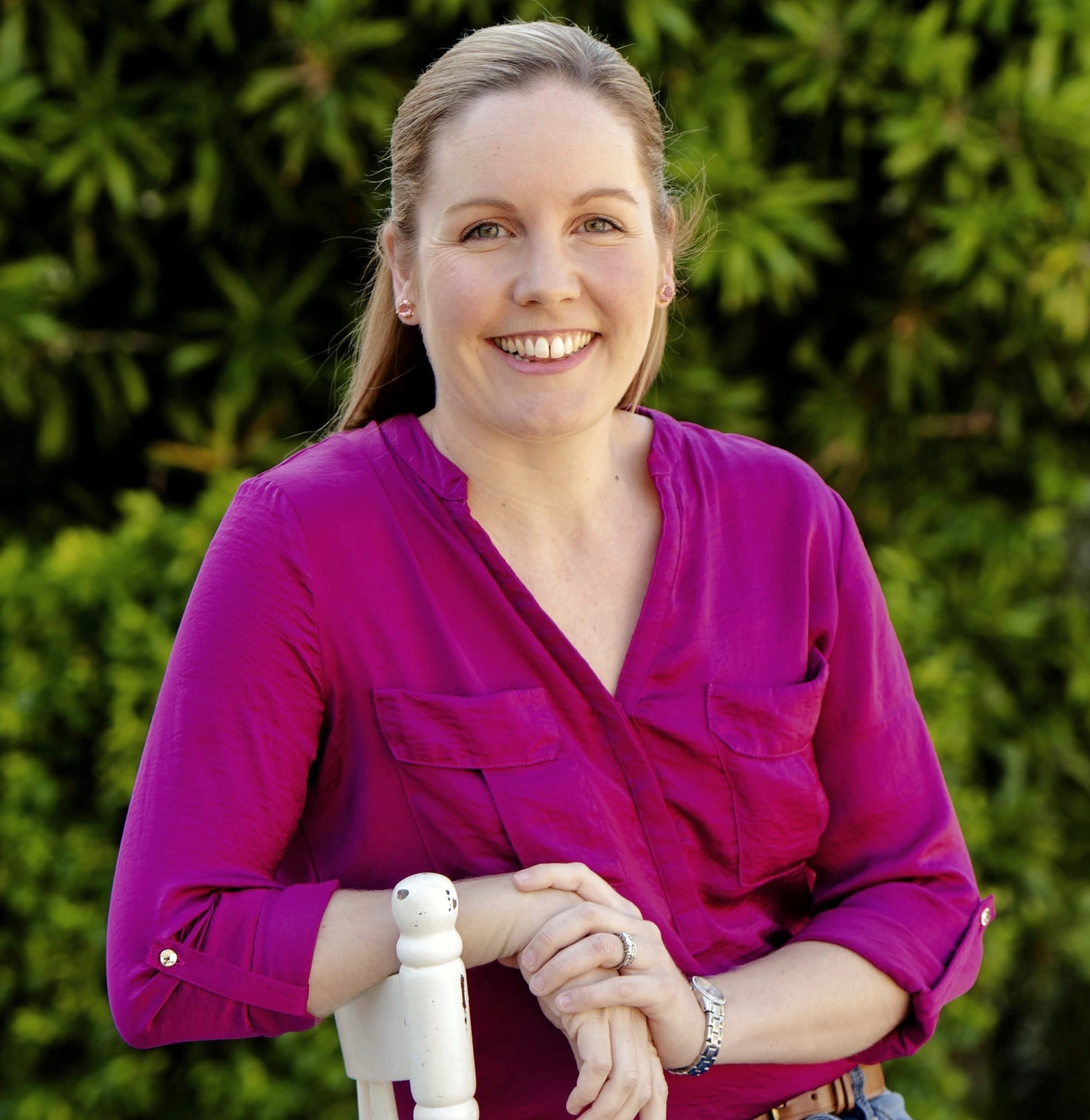
Are you looking for low-cost options to help the family stay cool this summer? The Gold Coast is home to a host of free or low-cost, family-friendly swimming spots that are sure to cool everyone off and provide hours of fun entertainment. Here are 8 spots to try this summer, from the northern most parts of the Gold Coast, right down to the southern Gold Coast.
Lions Park is located at the Jacobs Well Boat Ramp, and is a council-managed, netted swimming enclosure nearby the mouth of the Pimpama River. Here you will find a small sandy beach area with shade sails right up to the water’s edge, as well as barbeque and picnic facilities. This spot is great for younger children, as they can get a taste of the beach without large waves or long walks from the car to the water. Best visited at high tide, it can be a bit muddy at low tide.

Cabbage Tree Point is a small town just near Jacobs Well, with a boat ramp, small beach and Charlie Hammel Park. This is a great spot for the family to spend a morning – set up a picnic blanket under the trees by the ship-themed playground and enjoy a swim at the small, sandy beach. Again, being on the river this is best visited at high tide, but enjoyable all day long.
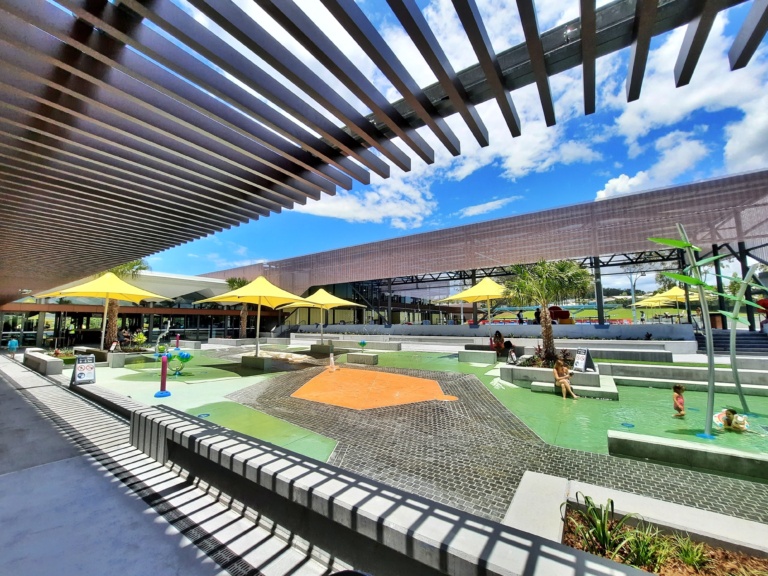
The Pimpama Sports Hub is the northern Gold Coast’s largest aquatic centre, with a 50-metre outdoor swimming pool, a 25-metre indoor swimming pool, learn to swim pool and a hydrotherapy pool. The children’s splash pad is exceptional, with water fountains, bubbling brooks and water at ankle depth – it’s ideal for toddler and primary school aged children.
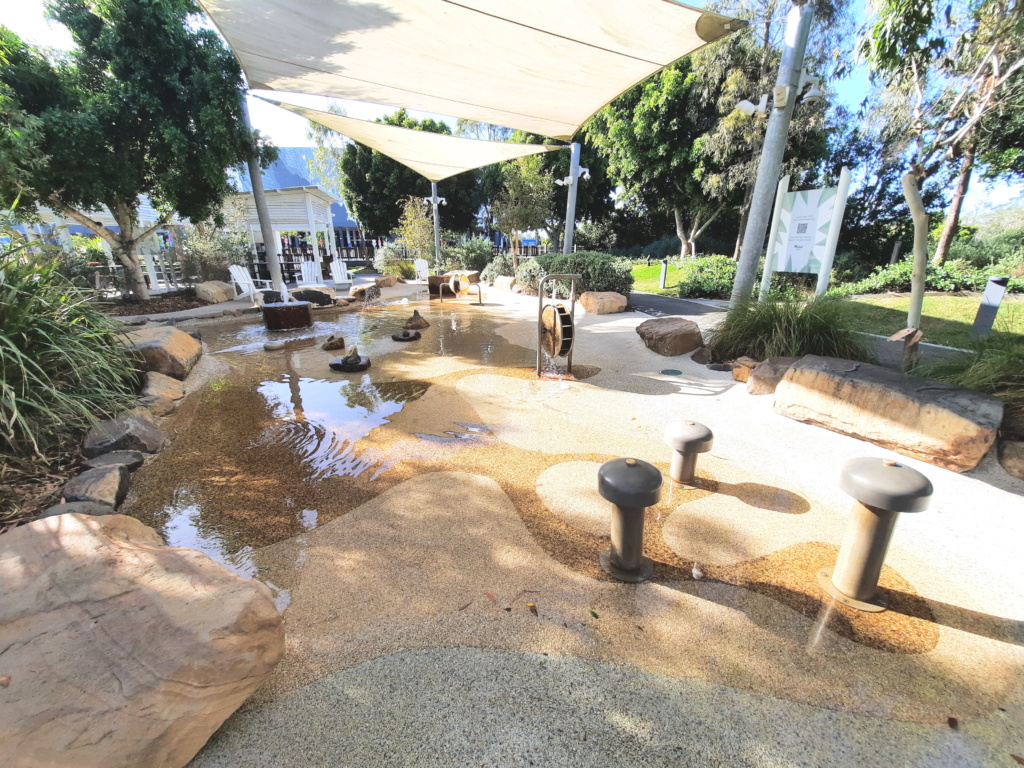
A splash pad might be the last thing you would expect to find at a shopping centre, but Westfield Coomera has one of the best free waterplay areas on the Gold Coast. Designed to resemble a billabong, waterways weave around interactive play stations where children can play with squirting frogs and jump across stepping stones. There are excellent change room facilities available and a café next door.
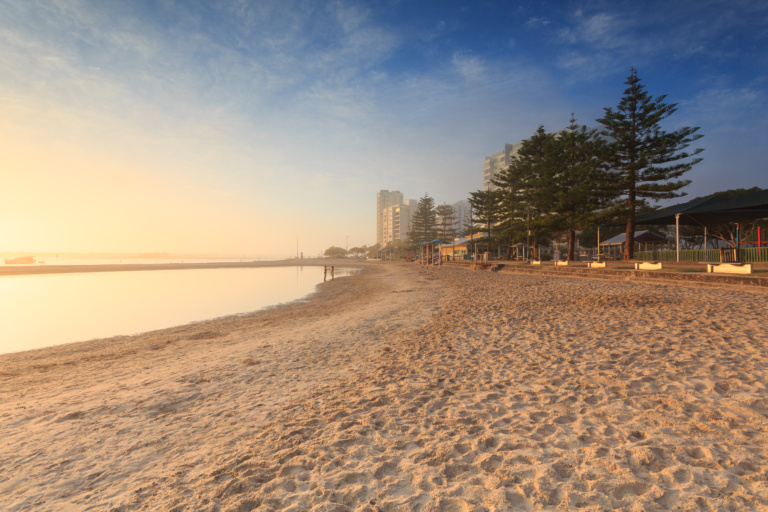
Ian Dipple Lagoon is a great place to go for a swim. Protected by a large sandbank, this lagoon is wave free and perfect for little ones. There are shower and toilet facilities along the shore as well, making the pack up easy. In the evenings, the lagoon is floodlit, so it’s also a great spot for dinner time fish and chips.
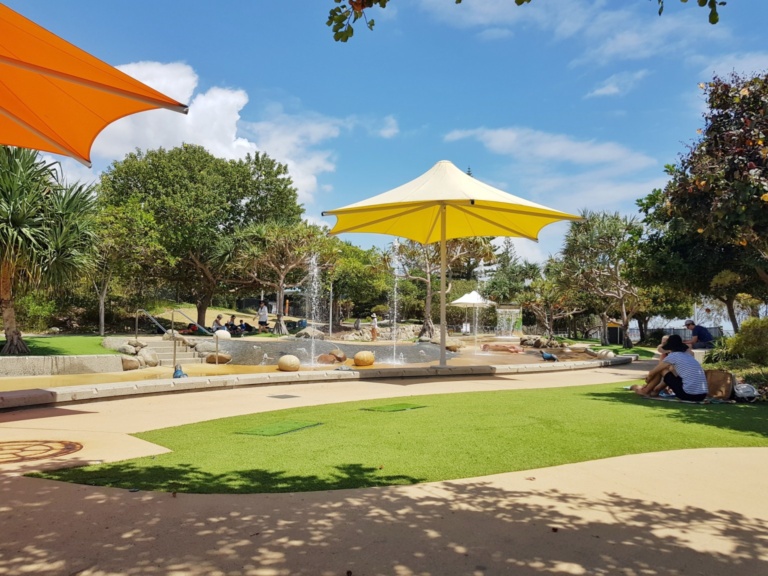
The Broadwater Rockpools might be the most popular water play space on the Gold Coast, with plenty of water fountains and vibrant marine-themed equipment to play with. The water play is built to resemble a creek bed, and it works like tidal rockpools with the water receding every 5-10 minutes and then returning again. The Rockpools are watched over by lifeguards during opening hours and it’s completely free to play.
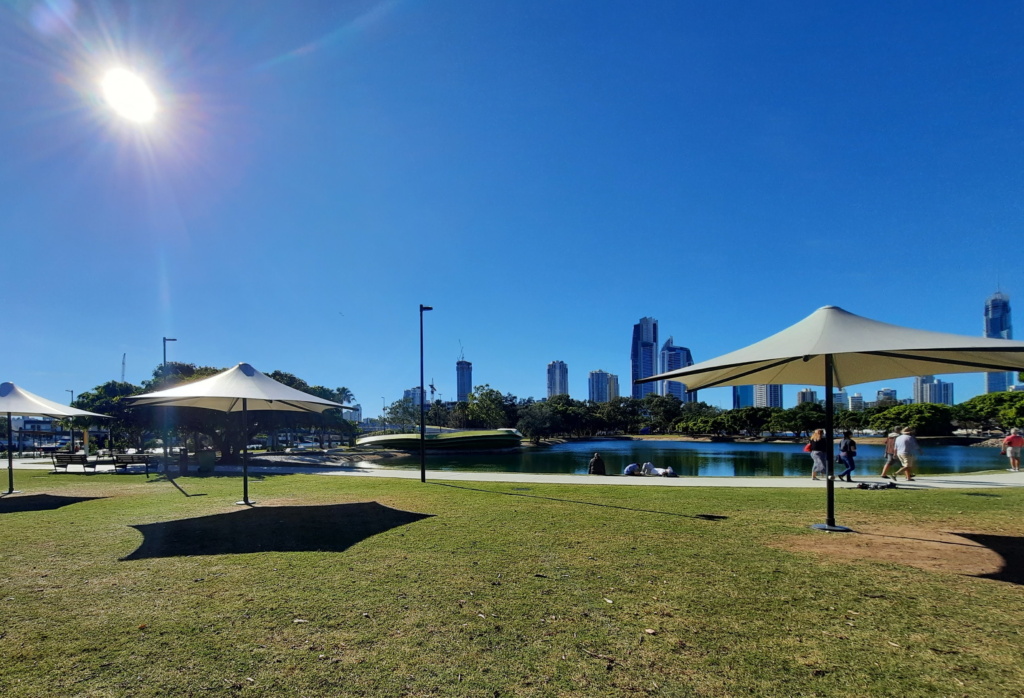
Located within the Home of the Arts precinct, Evandale Lake is a popular swimming spot for Gold Coasters. With a sandy beach around the outside, the lake has shallow edges but can be deceptively deep as you get further in. Families love to spend the day here, making the most of weekend food markets or a picnic lunch. There is a fun shaded playground by the lagoon too.
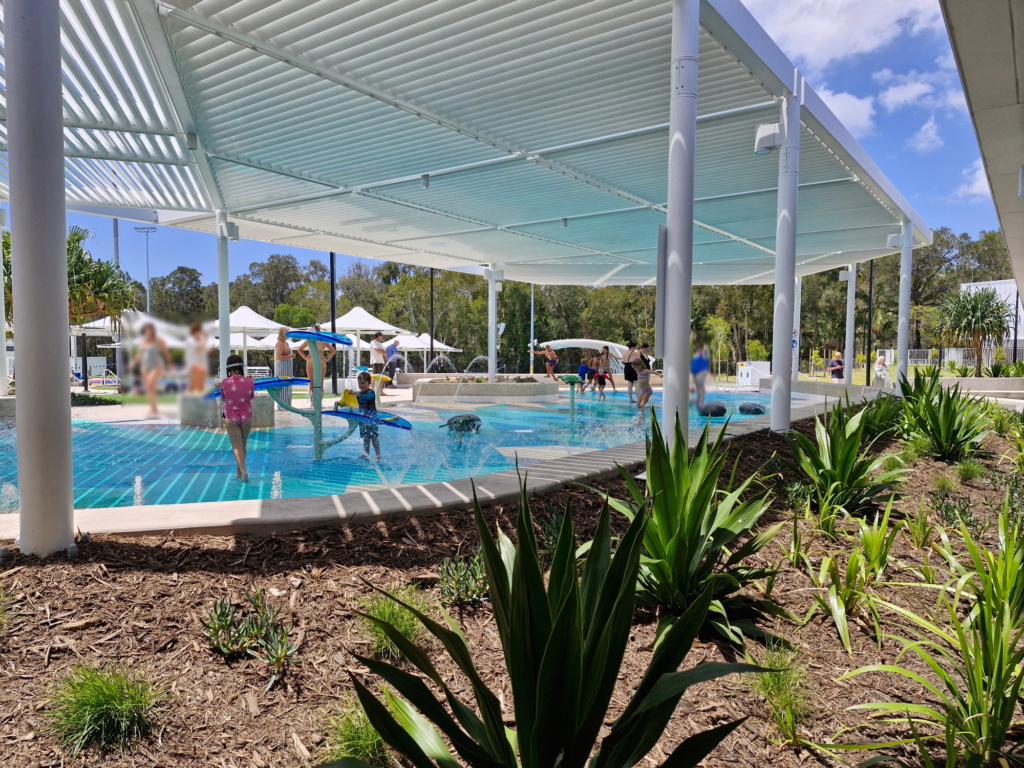
The newest water play destination on the Gold Coast, the Palm Beach Aquatic Centre opened at the end of October and now has a 50m outdoor pool, 25m outdoor pool, indoor warm water program pool, 25m indoor learn to swim pool, and an outdoor splash pad. The splash pad at Palm Beach is fairly simple in design, with plenty of sprayers along the ground as well as a few water play towers and spinners, but it is made entirely of a rubber base which is absolutely ideal for those crawling or learning to walk!
If you’re looking for early education and care for your young family, look no further than Little Scholars!
We offer your child the very best facilities, resources and early educational, play-based programs available, which are underpinned by the early years learning framework. We also believe in fun, wide-ranging experiences so that children can begin to develop interests and passions of their own, from Bush Kinder adventures to our broad extracurricular program which includes swimming for our kindergarten children, we believe in keeping wonder and magic in childhood.
Find Lara’s recommendations at her website Mrs. Lardeedah.com, and follow her socials Facebook and Instagram

Grandparents have always shared a special bond with their grandchildren, but nowadays they are also playing an increasingly important role as a caregiver, as children spend much more time with their grandparents than ever before. Sometimes however, the generation gap can make it hard to think of new and fun things to do together that appeal to everyone.
Whether the grandchildren are spending an afternoon, a weekend, or the school holidays with you, this list is sure to keep children and grandparents of all interests and physical abilities, entertained and making memories year-round.
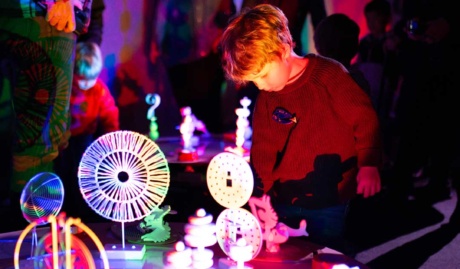
Each year, World Science Festival Brisbane paints the town red and takes science out of the laboratory and into the streets, parks, museums, galleries and performing arts venues of Brisbane and regional Queensland! World Science Festival Brisbane offers interactive and informative experiences for inquisitive young minds, with a huge range of family-friendly events and workshops.
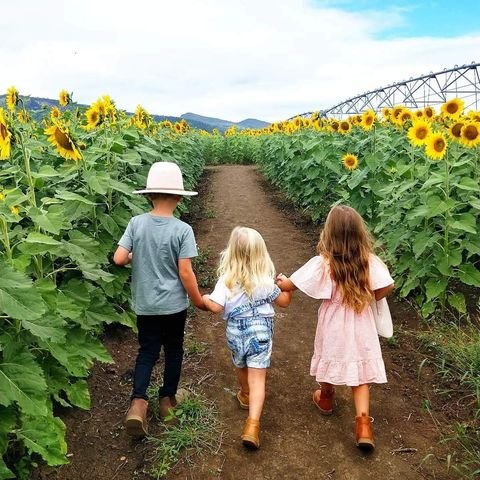
Gather your family and friends and join in a fun weekend in the Scenic Rim region, filled with live entertainment, workshops for children, cooking classes, mini photo sessions, arts, crafts and much more. Don’t forget the star of the show – strolling through beautiful sunflower fields and picking your own to take home.

Surfers Paradise beach becomes a playground of light, music and entertainment at SeaFire, Australia’s only international fireworks competition. Nations compete to take home the SeaFire Championship title, so this is a chance to see choreographed fireworks displays fired off ocean barges. Bring your picnic blanket and set up in the sand for beautiful firework vistas. There is also plenty of pre-entertainment including food trucks, music and roving performances.
5-8 pm, free!

Kalfresh Vegetables throw open the doors to their farm and factory and welcome carrot-loving visitors each June!
See how they grow, pick, wash and pack carrots, as well as celebrate all things carrot with carrot juice, carrot sausages, carrot cake and carrot bread! Everyone can get their hands dirty with carrot picking on the farm, taking home as many as you can carry.
This year’s date has yet to be released, so keep an eye on Kalfresh’s social media channels for its official date. This is held on the Scenic Rim, at Kalbar on the Cunningham Highway in the Fassifern Valley.
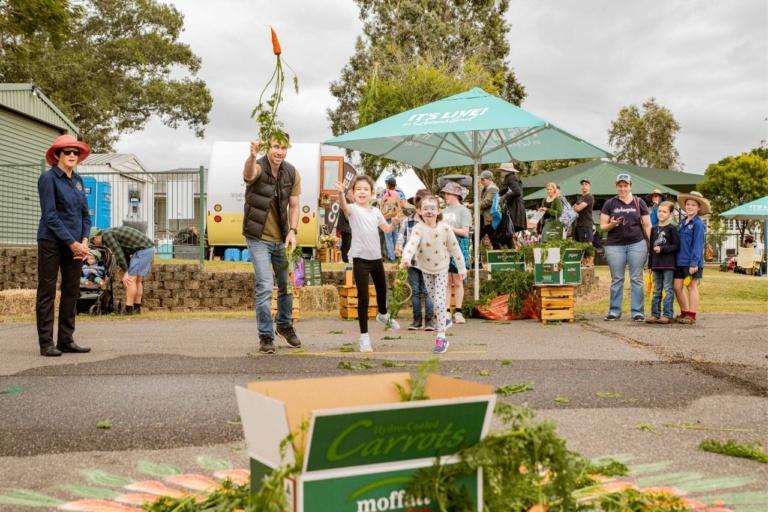
The Winter Harvest Festival is the Scenic Rim’s signature event where you can experience Eat Local Month in one glorious, flavour-filled day! Chefs, growers. producers, and artisans come together to showcase the region’s culinary treasures. There will be more than 60 market stalls offering fresh seasonal produce, local wines, beers and spirits, cheeses, meats, and more. Alongside these culinary delights, you’ll find a variety of handcrafted goods and local creations, all crafted by the region’s skilled artisans.
There are food displays, workshops, produce stalls and a huge festival environment where the children can take part in a variety of games, activities and food related fun.nteractive activities like tractor pulling, carrot tossing, and farm animal cuddles. They’ll enjoy face painting, garden games, and fun, educational experiences that teach them about agriculture and food in a hands-on way.
Don’t miss the annual Tractor Pull competition!
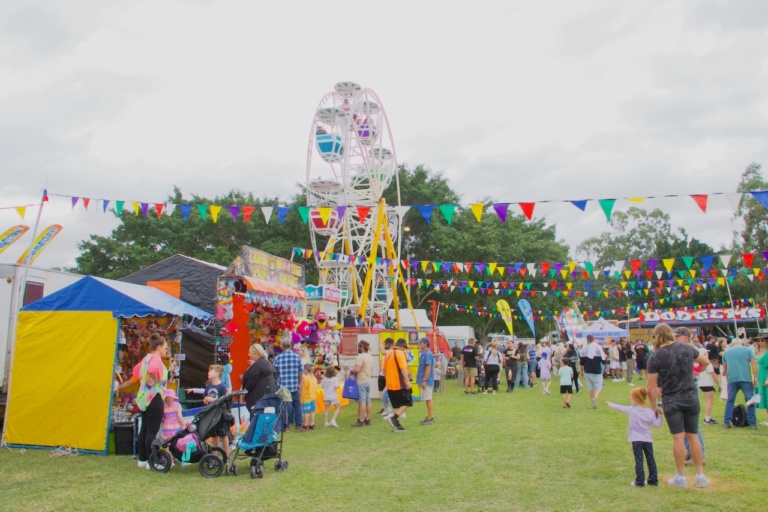
Where country meets the Gold Coast! Get up close and personal with cute animals, meet the farmers and exhibitors and taste delicious foods made from locally sourced ingredients. Watch the woodchop, and enjoy the equestrian program. Wander through the pavilions, check out the crafts and cooking, from honey to homebrew, lace to LEGO, fine arts to photography, and flowers to fruit sculptures and explore the best agriculture has to offer. Finish the day off with an incredible fireworks display!
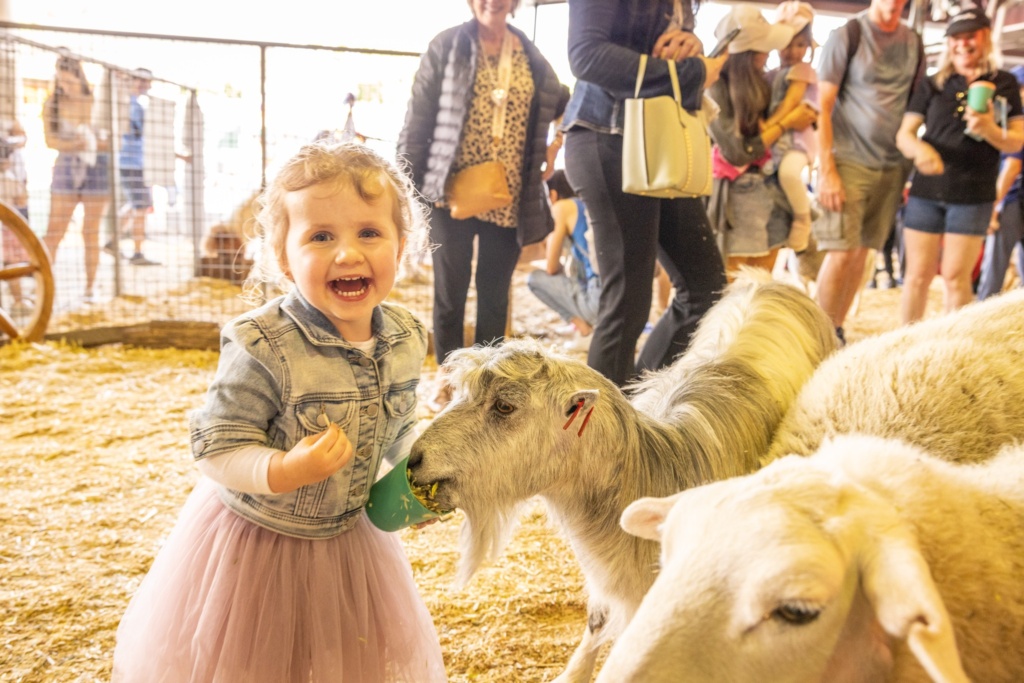
The Royal Queensland Show (Ekka) is Queensland’s largest and most loved annual event, now in its 149th year, bringing the country and the city together for a big celebration of agriculture. Enjoy competition entries from woodchop to giant vegetables, there’s 10,000 animals from beef cattle to cats and dogs, world-class live entertainment, award-winning food and wine, carnival rides and showbags, family shopping, educational activities and much more.

The Pacific Airshow Gold Coast is a three-day weekend event that features aerobatic demonstrations by the world’s best aviators. Attendees can join in meet and greets with the pilots, check out the family zone packed with aviation themed games and activities, and relax beachfront while watching paratroopers, stunt planes, helicopters, military planes and more from around the world perform.
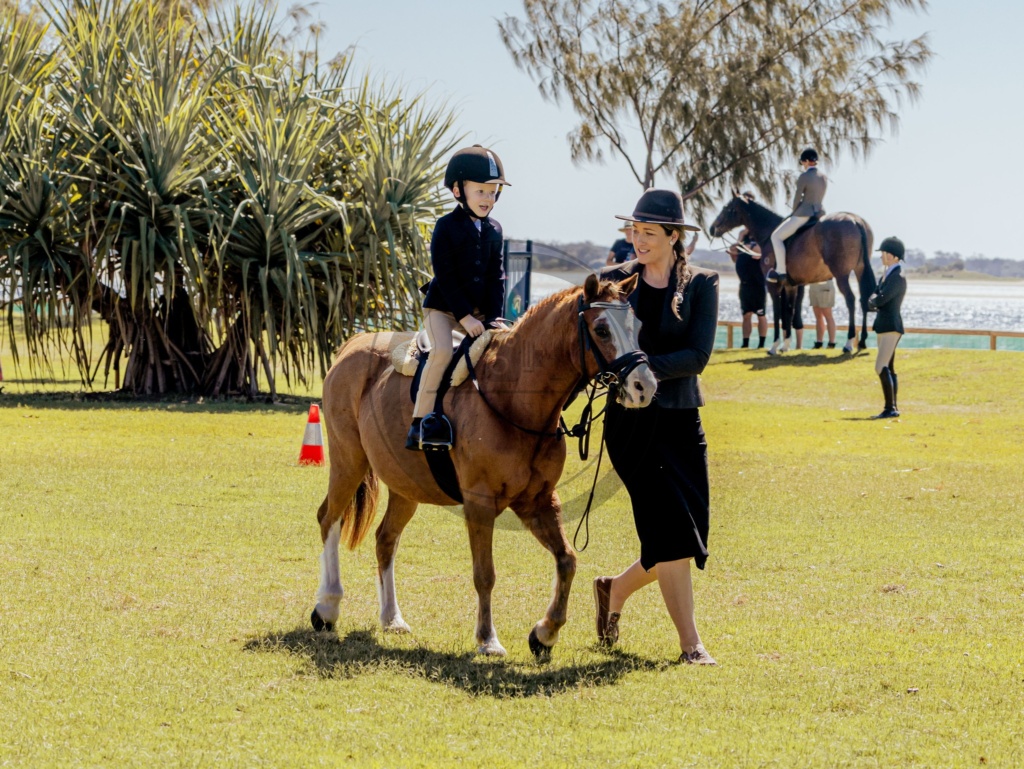
Immerse yourself in the family fun and excitement of the Gold Coast Show! Set on the beautiful Broadwater Parklands on the Gold Coast, this FREE show attracts tens of thousands of families annually. Enjoy woodchop, equestrian, food and beverage stalls, exhibits, games and rides. Each night also concludes with an incredible fireworks show.

Riverfire is Brisbane’s most spectacular night of the year. The launch event for the three-week Brisbane Festival, Riverfire brings families from across south-east Queensland to South Bank for a night that lights up the skies. Entertainment begins from 4pm, including an RAAF aerial display, with the main event – the state’s most spectacular annual fireworks display – lighting up the sky at 7pm.

RedFest is Redland City’s main event, showcasing musicians and artists from across the region. For two days, the Redlands Showground becomes a celebration of the amazing community, with performers sharing their skills across the showground. Families are also taken care of, with a children’s program, featuring a range of free activities including farm animals, puppet shows, rock climbing and free face painting, Sideshow alley and spectacular fireworks.
The date is still in the works, check RedFest’s social media channels for date confirmation.
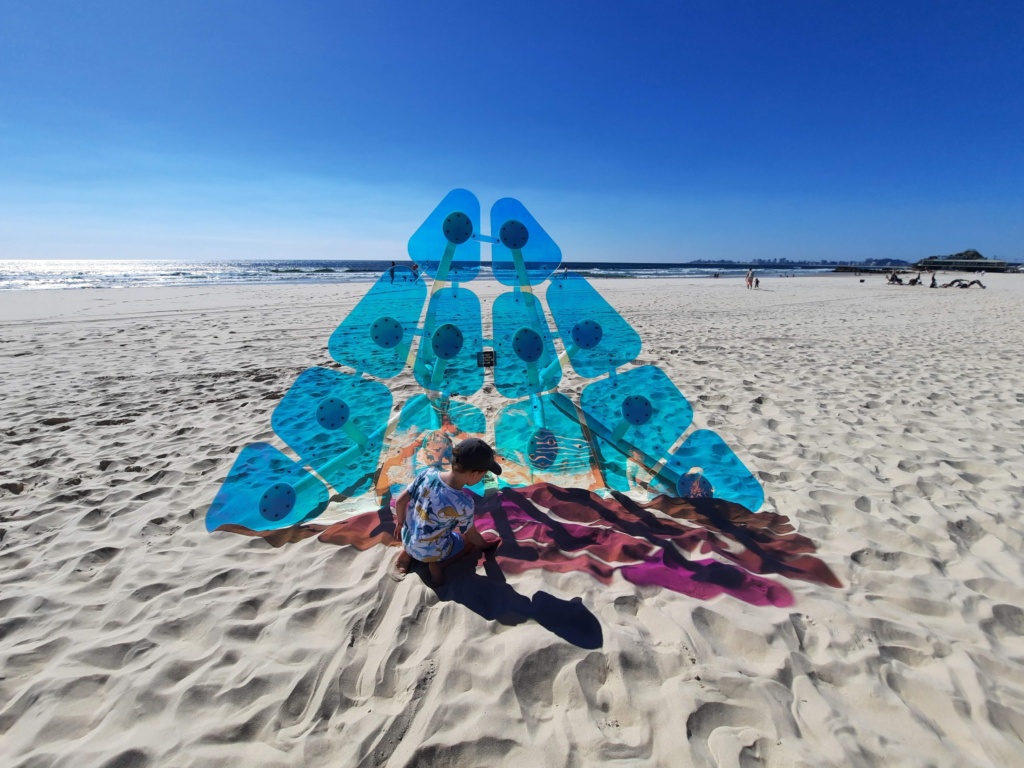
SWELL is Queensland’s premier outdoor sculpture exhibition, set along Gold Coast’s Currumbin Beach. For 10 days, more than 60 small, medium and large-scale sculptures will be set up along the beachfront and boardwalk for families to view.
The Family Zone activation is always popular, with workshops, activities, a BookFest setup where children can take home a free pre-loved book, live music and chill out zones set up under the leafy trees. Go at sunrise or sunset to beat the heat and experience the sculptures in a different light.
When considering how to look after your family during the work week, look no further than Little Scholars!
We offer your child the very best facilities, resources and early educational, play-based programs available, which are underpinned by the early years learning framework. We also believe in fun, wide-ranging experiences so that children can begin to develop interests and passions of their own, from Bush Kinder adventures to our broad extracurricular program which includes swimming for our kindergarten children, we believe in keeping wonder and magic in childhood.
Find Lara’s recommendations at her website Mrs. Lardeedah.com, and follow her socials Facebook and Instagram

The festive season is here and the opportunities to get in the spirit are endless! Why not check your shopping list off at a Christmas market, jingle along at a carols concert or putt your way through a Christmas wonderland. To make sure you do not miss out on the festive cheer, here is your go-to guide with only the best of the best Christmas happenings picked out for you. Be sure to add these dates to your calendar!
Get ready for an exciting and interactive Santa show! Join Santa, Mrs Claus and Rudolf for a Christmas extravaganza that includes a mix of traditional carols and current pop songs.
Pacific Pines Central Park, 4-8:30pm
Image via City of Gold Coast
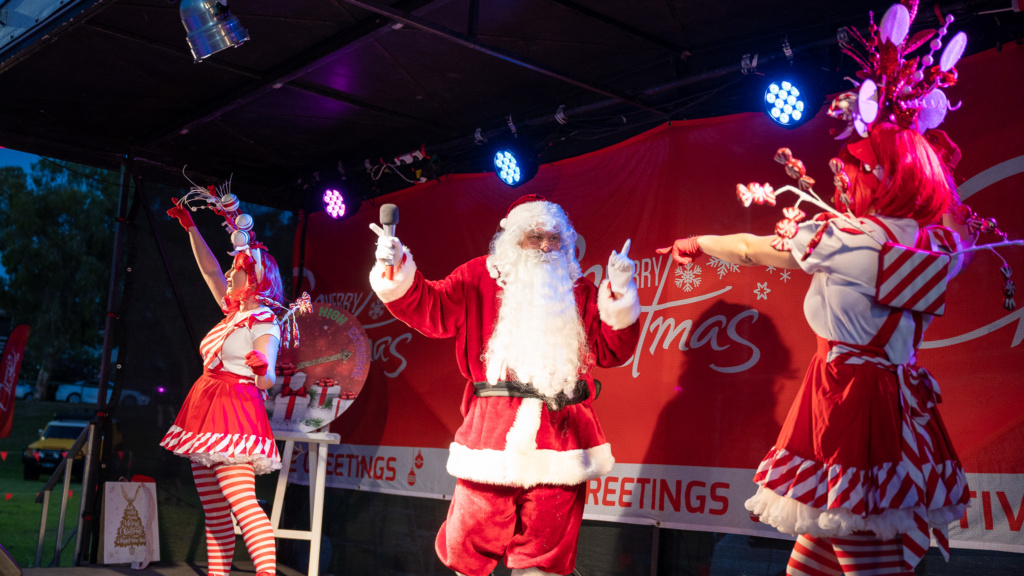
This free family festivity will feature live music, market stalls, inflatable fun, local restaurant specials, games and activities, plus a visit from Santa Claus.
Ron Short Park, 4-8pm

Bring your family for the largest carols event on the northern Gold Coast, an unforgettable night with fireworks, food vans, and festive sing-alongs.
Brien Harris Oval, from 4pm
Image via Northern Gold Coast Carols Facebook page

One of the all-time favourite Christmas carols will be performed in a 2-hour celebration of song and dance on the beach, with a visit from Santa, and a fireworks finale!
Surfers Paradise Beach, 5-8pm
Image via City of Gold Coast
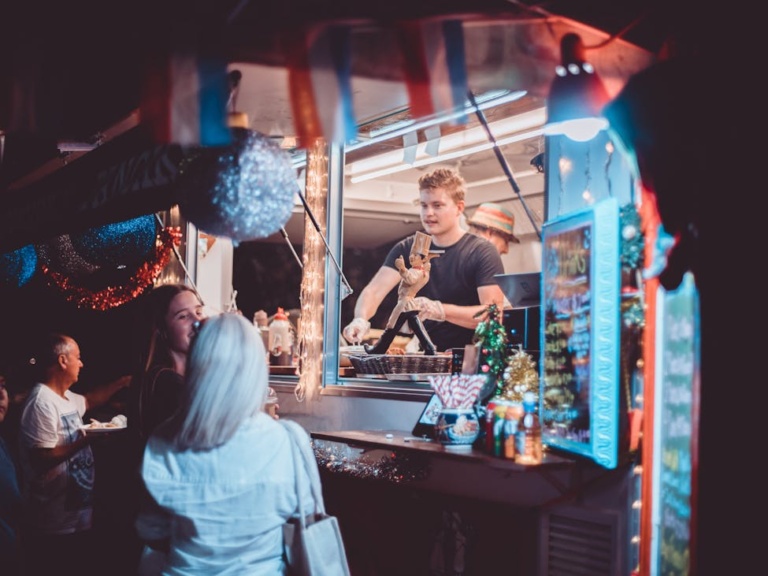
Wind your way through the Market lanes to the sweet serenades of stunning live music, spot roving performers, snap a selfie with an elf… or meet Santa himself!
Home of the Arts, 4-9pm
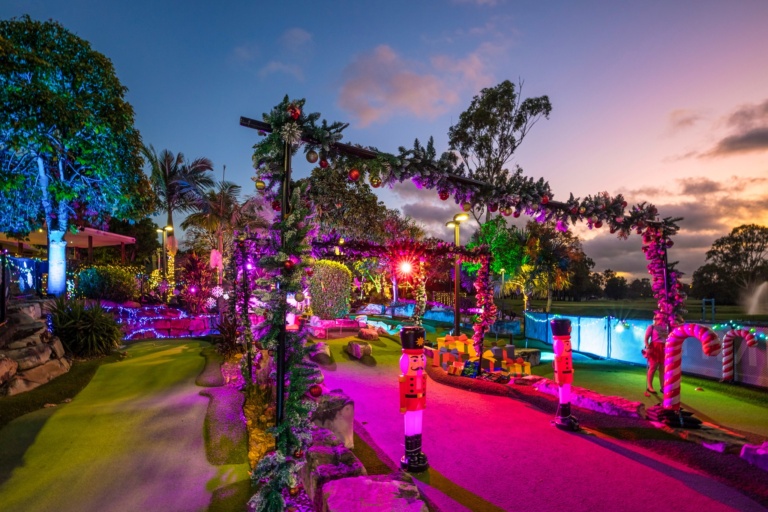
The elves have been busy transforming the 9-hole mini golf course into a spectacular Christmas wonderland!
76-122 Napper Road, Parkwood
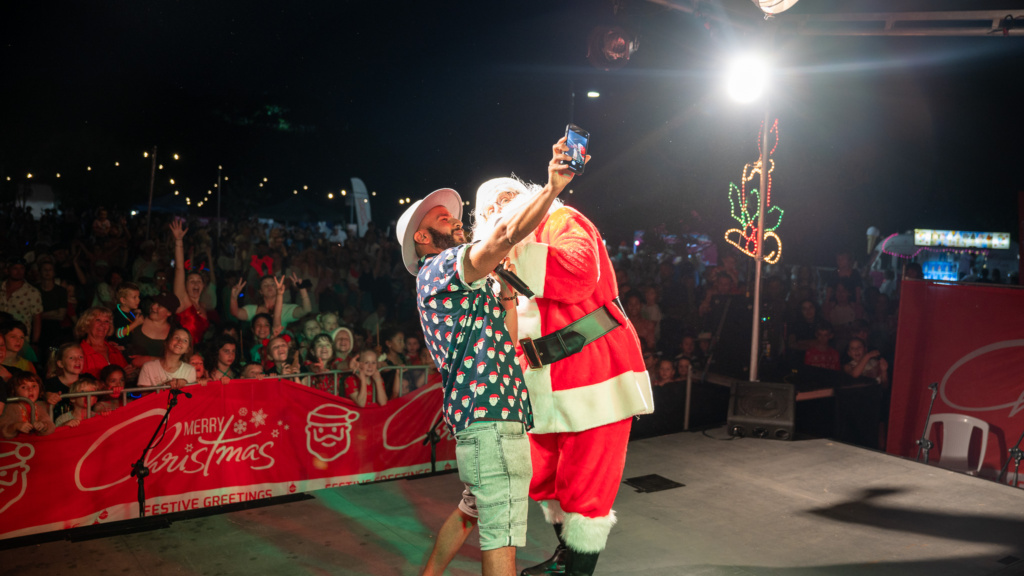
Free live music on stage, roving performers, children’s entertainment, fantastic food trucks, and Christmas market stalls. Plus see Santa making a special appearance alongside a fireworks display.
Ed Hardy Park, 4-8pm
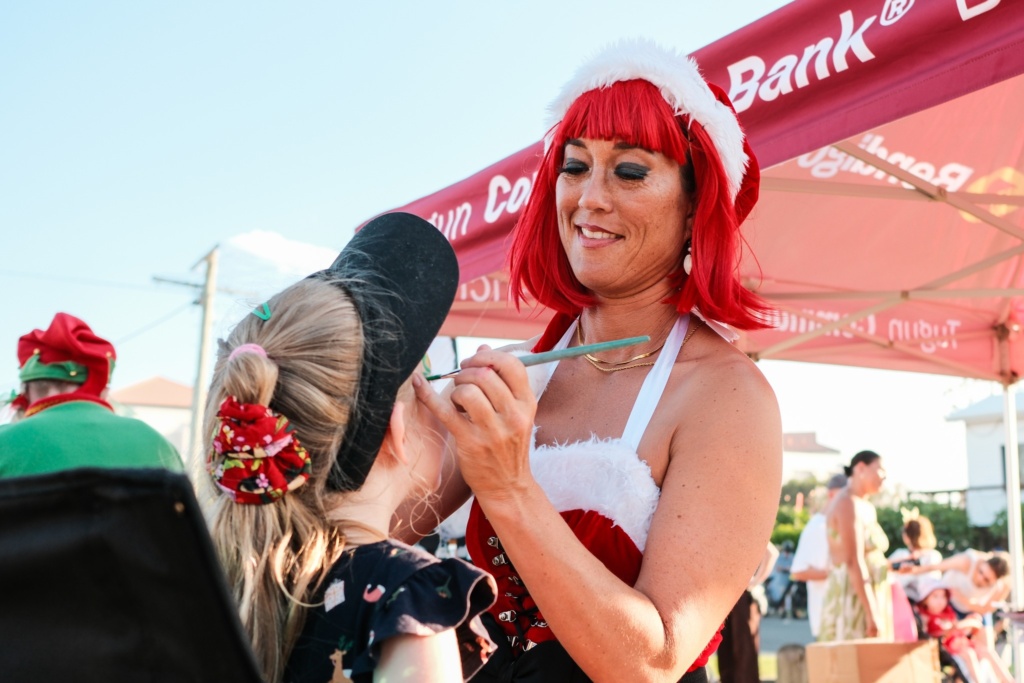
Dine under the stars at one of the fantastic local eateries, check out the local business offerings, and visit the Christmas market stalls. Plenty of free children’s entertainment on offer throughout the program with Santa making a special appearance!
Toolona Street, Tugan, 4-8:30pm

Sing along to your all-time favourite carols, enjoy a delicious assortment of food trucks, watch Santa fly in and watch a sparkling fireworks finale!
Queen Elizabeth Park, 5:30-7:30pm
Image via Shutterstock
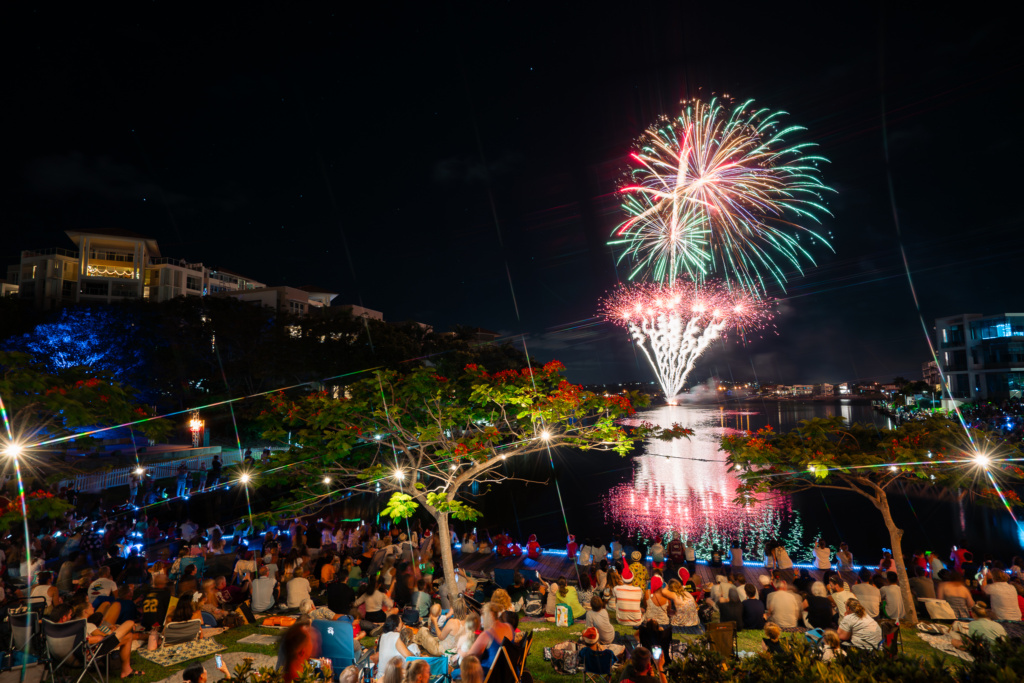
A truly unique festive celebration, this event will feature live stage entertainment, Christmas carols, Santa, Fireworks over the beautiful Lake Orr and much more!
Waterfront Stage, Varsity Lakes, 4-8pm
Image via Carols on the Lake Facebook page

A fabulous, family Christmas event with market stalls, food trucks, Santa, Christmas carols, live music, facepainting and free children’s craft area.
Mudgeeraba Showgrounds, 3-8pm
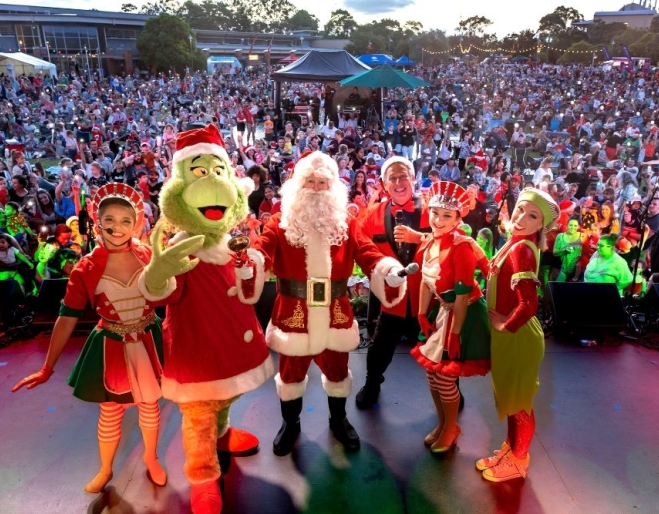
The City of Logan Christmas Carols is the city’s biggest annual Christmas event. This free, family-friendly event features hours of on-stage entertainment, festive activities, food trucks, and markets, all jam-packed into one magical day.
Kingston Butter Factory Cultural Precinct, 3-8:30pm
Image via Must Do Brisbane
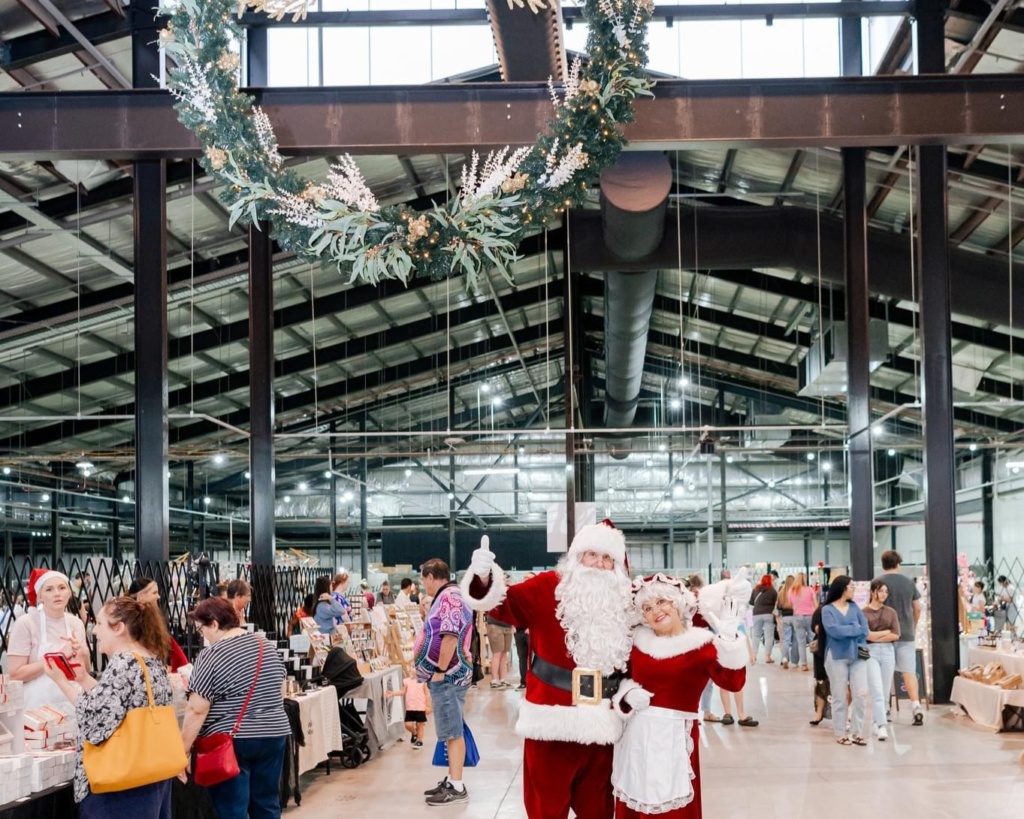
Experience a pop-up Christmas market brimming with a variety of local vendors, a special visit from Santa’s elves, and Mr & Mrs Claus will drop by for photos under a larger-than-life wreath, suspended above the Market Hall.
Distillery Road Market, 11am-9pm
Image via Facebook event

A free 7-minute light and sound show running at 6:30pm, 6:45pm, 7pm & 7:15pm. Get ready to catch all the “bubble snow” at the end!
Image via Redland Performing Arts Centre
If you’re looking for early education and care for your young family, look no further than Little Scholars!
We offer your child the very best facilities, resources and early educational, play-based programs available, which are underpinned by the early years learning framework. We also believe in fun, wide-ranging experiences so that children can begin to develop interests and passions of their own, from Bush Kinder adventures to our broad extracurricular program which includes swimming for our kindergarten children, we believe in keeping wonder and magic in childhood.
Find Lara’s recommendations at her website Mrs. Lardeedah.com, and follow her socials Facebook and Instagram

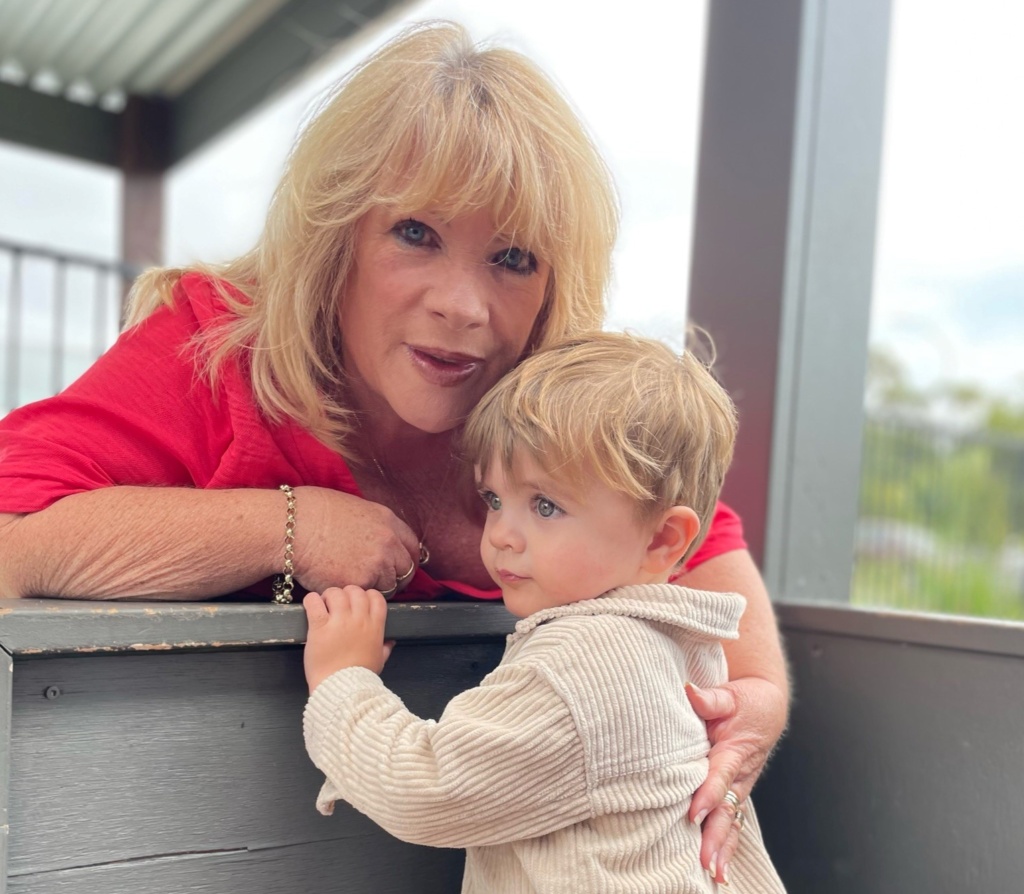
Grandparents have always shared a special bond with their grandchildren, but nowadays they are also playing an increasingly important role as a caregiver, as children spend much more time with their grandparents than ever before. Sometimes however, the generation gap can make it hard to think of new and fun things to do together that appeal to everyone.
Whether the grandchildren are spending an afternoon, a weekend, or the school holidays with you, this list is sure to keep children and grandparents of all interests and physical abilities, entertained and making memories year-round.
A beautiful day on the Gold Coast’s waterways make for some stunning views and great sight-seeing! The Gold Coast’s very own hop-on hop-off ferry is the perfect multi-generational way to spend a day. Departing hourly from five iconic Gold Coast destinations, including the famous Surfers Paradise and HOTA, Home of the Arts, you can hop on at any of the five stops, and stay aboard for the full loop (two hours) or explore the hop-off destinations at your leisure. Enjoy a drink from the onboard bar whilst the friendly captain keeps you entertained with informative commentary, music, local tips and wildlife spotting. Children can also meet the captain and have a turn driving the boat. There are a range of ticket options available, from day passes to long hops and short hops – depending on your budget and timeframes. Children under five always travel for free too!
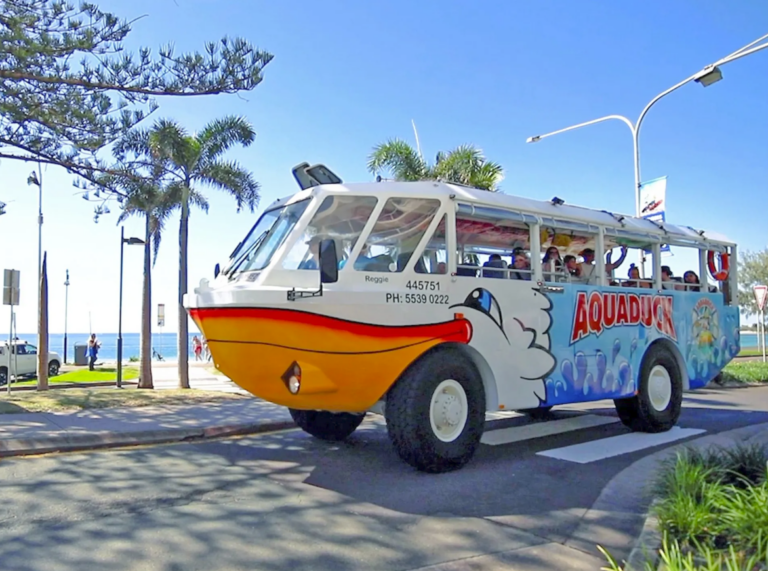
Another way to take to the water is with the iconic AquaDuck, and while it’s touristy, it’s a really great family outing, and perfect for multigenerational passengers. Embarking in the heart of Surfers Paradise, drive down the Esplanade overlooking the beautiful beaches and head towards The Spit. Once you reach the boat ramp just past SeaWorld, the tour changes pace and you’re heading for the water! Watch as the amphibious ‘duck’ changes from bus to boat and gently glides into the water. Now you’ll head through the Broadwater to check out how the millionaires live. You’ll finally return to land and drive down Tedder Avenue, before finishing back up at Cavill Avenue. The tour takes about an hour and is very family friendly, with children offered the chance to drive the boat and get their Captain’s certificate!
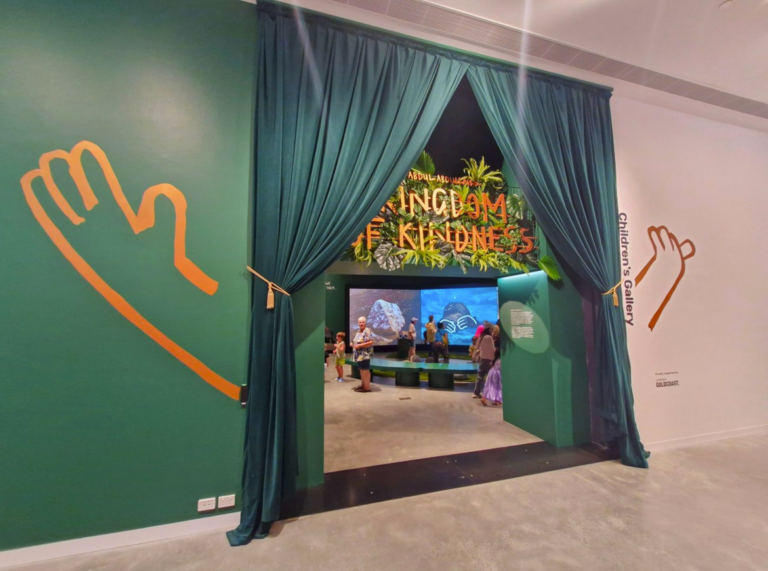
While the HOTA Gallery may be designed to cater for international art exhibitions, grandparents looking to give the grandchildren some culture will feel right at home! The Children’s Gallery at HOTA Gallery lets little artists get hands on – you won’t find any “do not touch” signs here! The Children’s Gallery changes every few months, each time offering a variety of interactive exhibits that complement the main galleries. After visiting the Children’s Gallery, take a stroll through the other free Galleries where you’ll find a few installations that are interactive and the children will love. Be sure to also ride the lift to the top floor and take in the Gold Coast skyline view! Fabulous 270 degree views await and there’s a guide you can use to work out what all the buildings are.
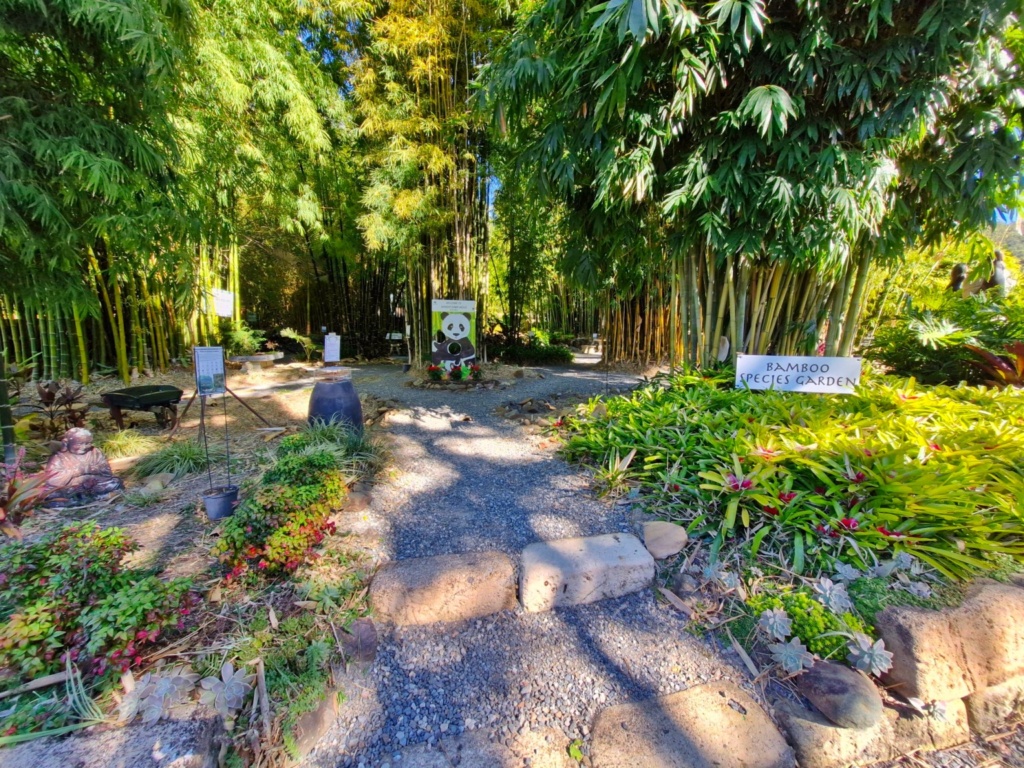
Bamboo Down Under at Wongawallan is a garden centre with a difference. The perfect grandparent’s day out, here you can explore a species garden, meditation garden, labyrinth, sensory garden and bamboo tunnel, and get bamboozled in the bamboo maze! Children can take on the Scavenger Hunt to discover the hidden pandas, all the while having a look at some incredible ornamental species of bamboo. Don’t miss the Rainforest Walk, a very peaceful stroll through a forest of enormous bamboo varieties. Dotted throughout are information signs about bamboo, little panda ornaments and other garden statues. Don’t miss the enchanted hollow at the end of the Tunnel.
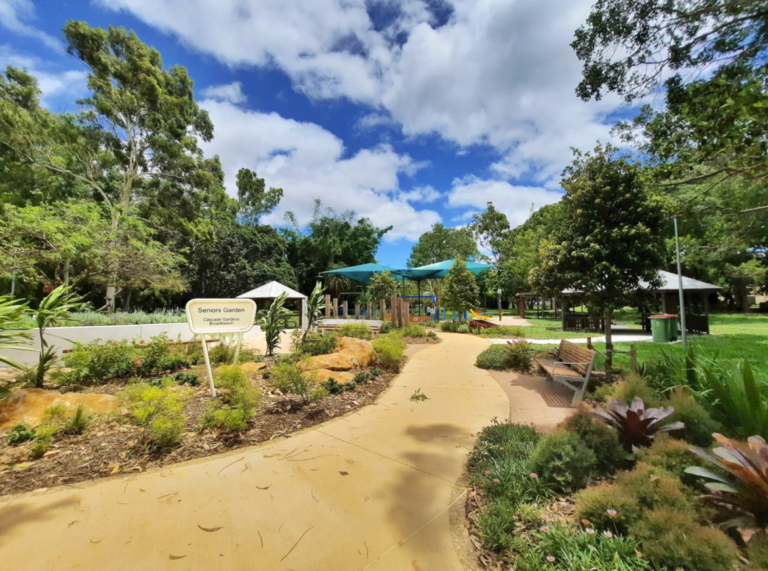
The Cascade Gardens at Broadbeach has a special addition of a sensory garden designed for seniors, but it also makes for great fun for little ones! In the sensory garden you’ll find elements including a musical gong, wayfinding design and productive gardens that encourage you to interact with the gardens through sight, touch and smell. It’s a beautiful addition to the Gardens and makes this spot perfect for multi-generational get togethers! The playground is older in style, but the children don’t seem to mind. You’ll find a flying fox, rope bridge, rock climbing wall and a carousel.
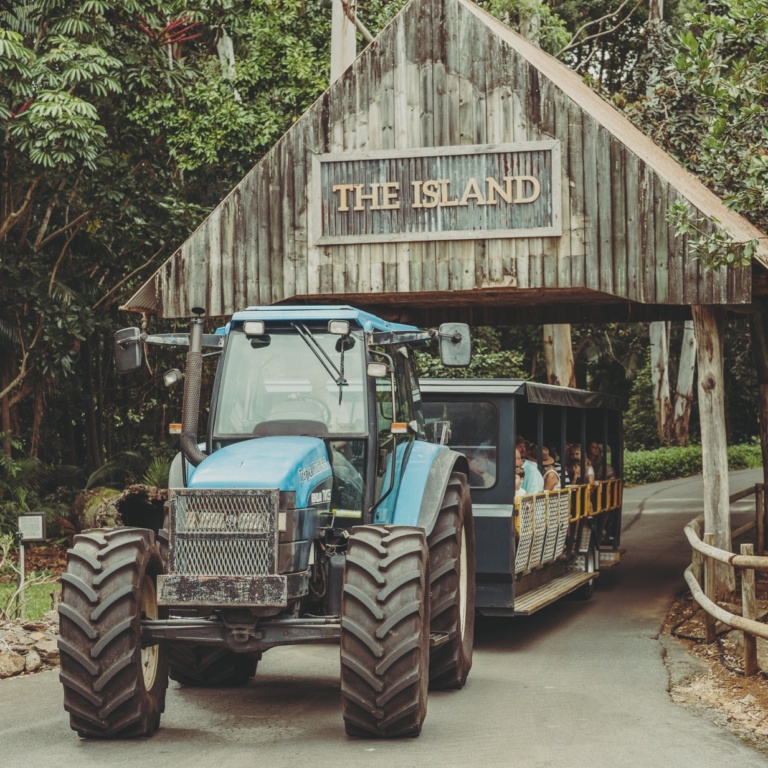
For the more active grandparents, a visit to Tropical Fruit World just over the NSW border in Duranbah is a fabulous day out for the family! Book a Farm Tour and experience a fruit tasting and a tractor-driven guided park tour. On the tour you can pick and eat bananas straight from the tree, crack macadamia nuts, feed and pat kangaroos, sheep, alpacas and miniature horses, and enjoy a short wildlife boat cruise too! At the end of the tour visit Wildlife Island and burn some energy on the flying fox, mini golf course and volleyball court. Then, check out the fruit market, café, and the huge sandpit by the grassed lawn to relax. If you live in the Tweed, Gold Coast, Byron, Lismore and Ballina, you can purchase tours at a discounted rate.
(Image with thanks to Tropical Fruit World)
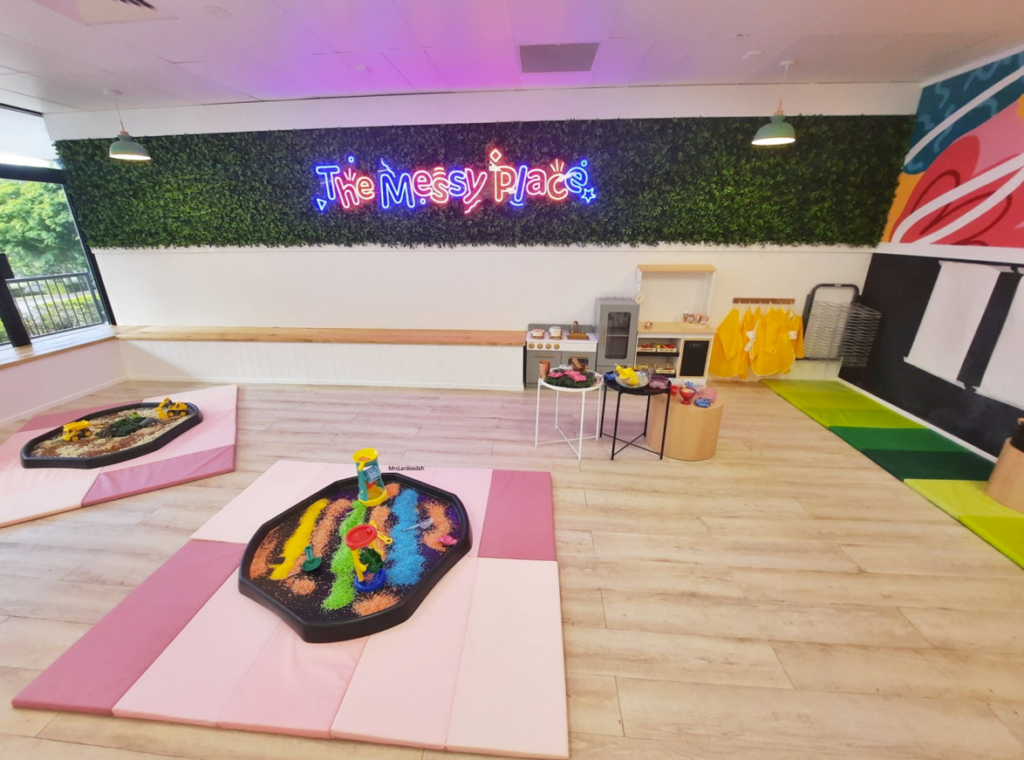
The generational gap can sometimes be hardest when the grandparents are tasked with spending time with energetic little toddlers. Keeping up with their ever-changing attention span, endless energy and natural curiosity is challenging for everyone! The Messy Place at Ashmore is the ultimate creative sensory play centre on the Gold Coast, designed exclusively for children under six years of age. They offer creative and messy play sessions in a safe and enjoyable environment, where they can unleash their imagination and make a mess. Exploration is encouraged, and grandparents can feel reassured being indoors in a secure, enclosed space. Sessions are booked on a casual basis and run five days per week.
National Grandparents’ Day is celebrated in Australia on the last Sunday of October. But as we all know, Grandparents Day is any day that the grandchildren can spend precious time with their grandparents. Whether you are a parent looking for how your child can have fun with grandma and grandpa or a grandparent seeking things to do with your grandchildren, we hope these ideas will inspire your time together.
We wholeheartedly believe in the proverb ‘it takes a village to raise a child.’ Little Scholars is proud to be a part of communities across South East Queensland, and we’re happy to play a small role in childhoods across the Gold Coast, Redlands and Brisbane.
We offer you and your child the very best facilities, resources and early educational, play-based programs available, which are underpinned by the early years learning framework. Our belief is that through quality education and care for children we can also encourage, assist and support the entire family.
Our dedicated team of educators are committed to the individual needs and interests of children and their families, and thus we encourage and welcome family input and involvement.
We aim to be like an extension of your family and are very relationship-driven. We support nurturing relationships between our educators and your child, the relationships your child has with the other children who attend, and we value our relationship with you as the parent and other family members. So book a tour today to get started!
Find Lara’s recommendations at her website Mrs. Lardeedah.com, and follow her socials Facebook and Instagram

While many Gold Coasters head to the southern suburbs on the weekend, the northern suburbs should not be overlooked for family-friendly weekend adventures! Starting in Stapylton and reaching to Pimpama, the most northerly suburbs of the Gold Coast also include Yatala, Alberton, Steiglitz, Gilberton, Norwell, Ormeau and Jacobs Well. Here you will find unique family activities, a range of family-friendly dining options, and some of the Gold Coast’s most unique play spaces. Here is your guide to getting the most out of a day in the Northern most parts of the Gold Coast.
South-east Queensland’s last original open-air Drive-In Cinema is located in Yatala, and boasts three massive screens accommodating up to 700 cars each night. Bring your camp chairs and sit out the back of your car to watch a movie, or bundle up the blankets, pillows and sleeping bags to make yourself comfortable in the back of your van, ute or car. Perfect for wriggly children, the privacy of sitting in your own vehicle means there is no need to worry if their bouncing around is bothering other cinema patrons. Movies screen every night of the week and they often host special event screenings too.
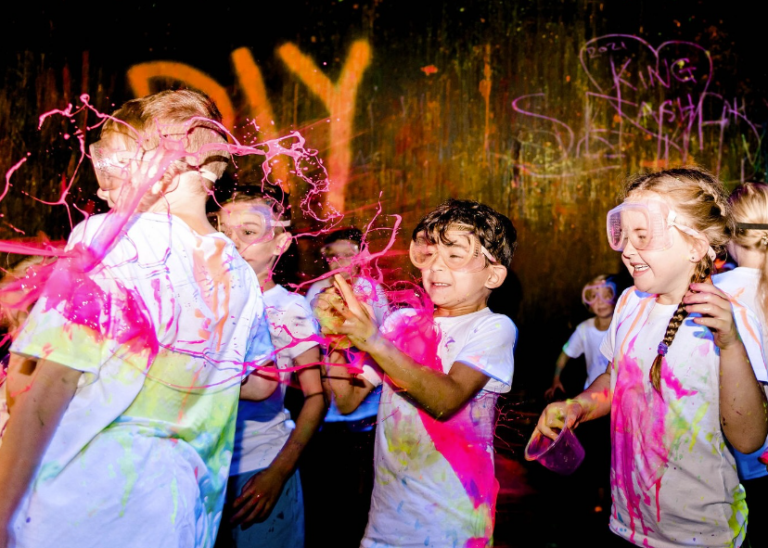
If your family is feeling creative, or looking to get messy, a workshop at DIY Invasion is sure to tick the box. Located at Staplyton, DIY Invasion run craft workshops ranging from resin art to painting, macrame and slime making – with their School Holiday Workshops always extremely popular for children. Another unique feature is their Splatter and Splash Room, which families can book for a private experience! Choose your own dance music, while letting your creativity run wild as you fling, flick, and splash paint around the room and over your fellow participants! This is a great space to unwind and tap into creativity.
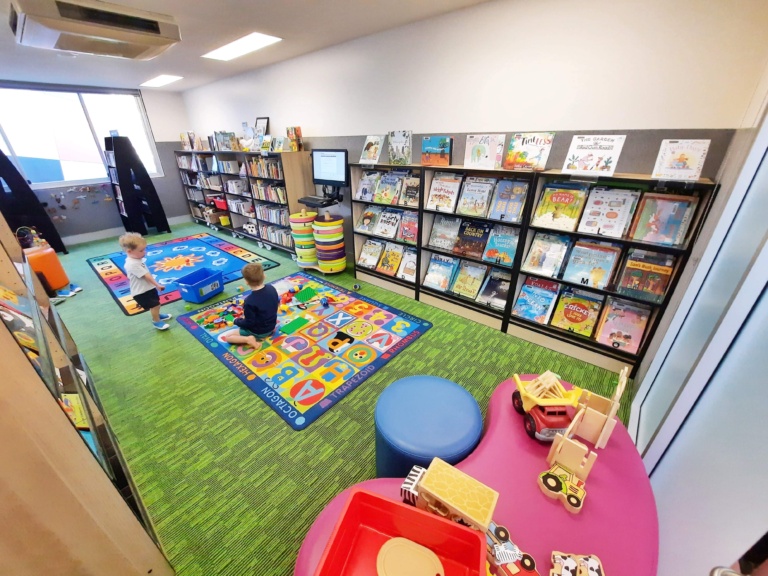
The only library located in the far northern suburbs, the Ormeau Community Lounge & Library is a hidden gem. Here you can visit the Gold Coast’s only Book Box corner, an early year’s library and play-based learning space delivered in partnership with Queensland State Library’s First 5 Forever program. Here children do not have to worry about being quiet, and they are actively encouraged to play with the many games and play resources available. Open six days a week, families can join in Story Time on Friday and Saturday mornings, or participate in Baby Rhyme Time and Toddler Time sessions during the week.
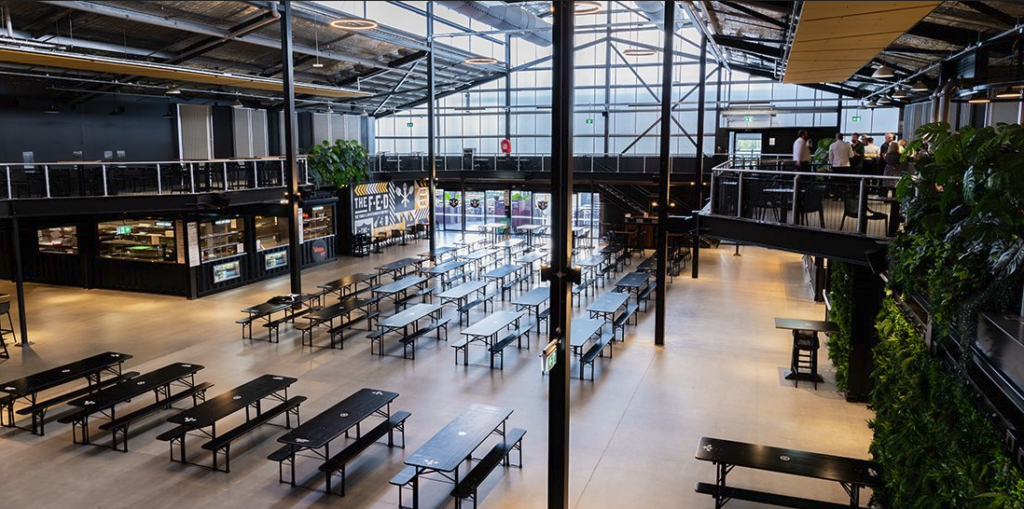
Distillery Road Market is a fresh and exciting new venue located in Eagleby, home to The F.E.D, a 2000-person food and entertainment space. Here you’ll find an expansive indoor/outdoor dining area, with a range of on-site eateries to choose from. Open Thursday – Sunday, the venue is family friendly with live music each evening and long beerhall-style tables to choose from. The best part is that diners can choose meals from six different food outlets, meaning that all tastes and dietary requirements can be catered for! The casual vibe of this venue is perfect for an early dinner with the family, where children and parents can relax, move around, dance and enjoy a great meal together.
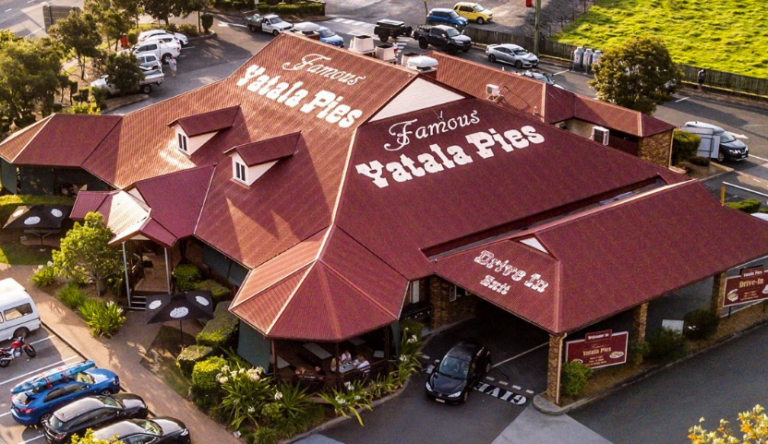
Yatala Pies has been a landmark in the Yatala area for more than 130 years, these days selling around 3,500 pies daily! Well known as a halfway stop on the journey between Brisbane and the Gold Coast, northern Gold Coast locals are lucky to have this icon right here in their backyard. Selling some of the best pies on the Gold Coast, the quality is exceptional and the range delicious. Choose from dine in or takeaway, you can grab a hot, ready-to-eat snack pie, or take-home, oven-ready family pies and snack pie packs. With something for everyone, the family will love a stop in at Yatala Pies any time of the day.
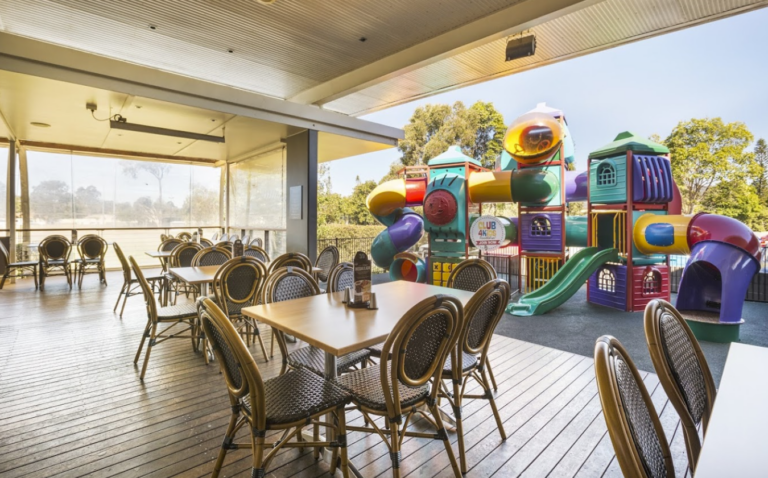
The Norfolk Tavern has got to be the most family-friendly dining option in the northern Gold Coast. Indoors you will find a bright and spacious dining room, while outside there is a wraparound veranda with ample space for dining, opening on to a huge children’s playground. The award-winning Bistro has menu options to suit every taste, from fresh seafood to steaks, pastas, salads and all the traditional pub fare. Extremely popular on weekends, be sure to book a spot on the deck if you are dining with children for easy line of sight from your table to the playground.
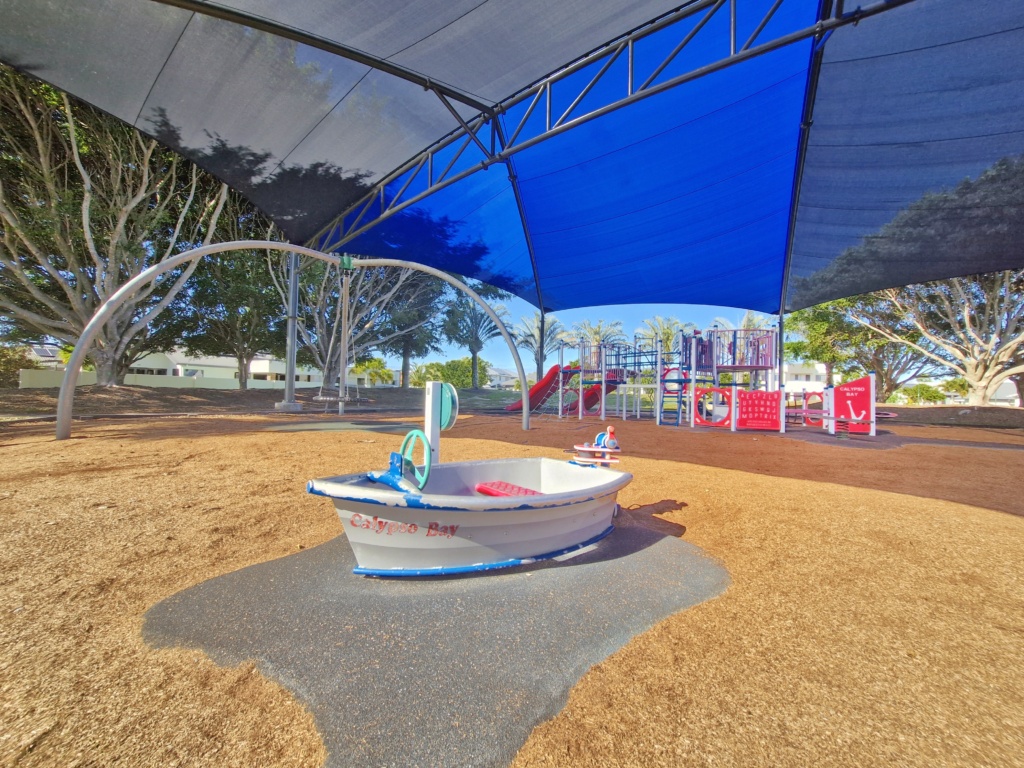
A nautical themed playground appropriate for its position by the water and close by the Calypso Bay Marina, here you’ll find a pirate ship brimming with bridges, wheels, slides and nets – be careful, you might even be asked to walk the plank! Underneath the pirate ship the imaginative play space is further extended, with a small shop counter set up, tunnel frames and other interactive game panels. The swing set with all abilities swing is always popular, as is the spinners and hammock swing. There’s also a little boat for children to pretend to fish or start the engine!
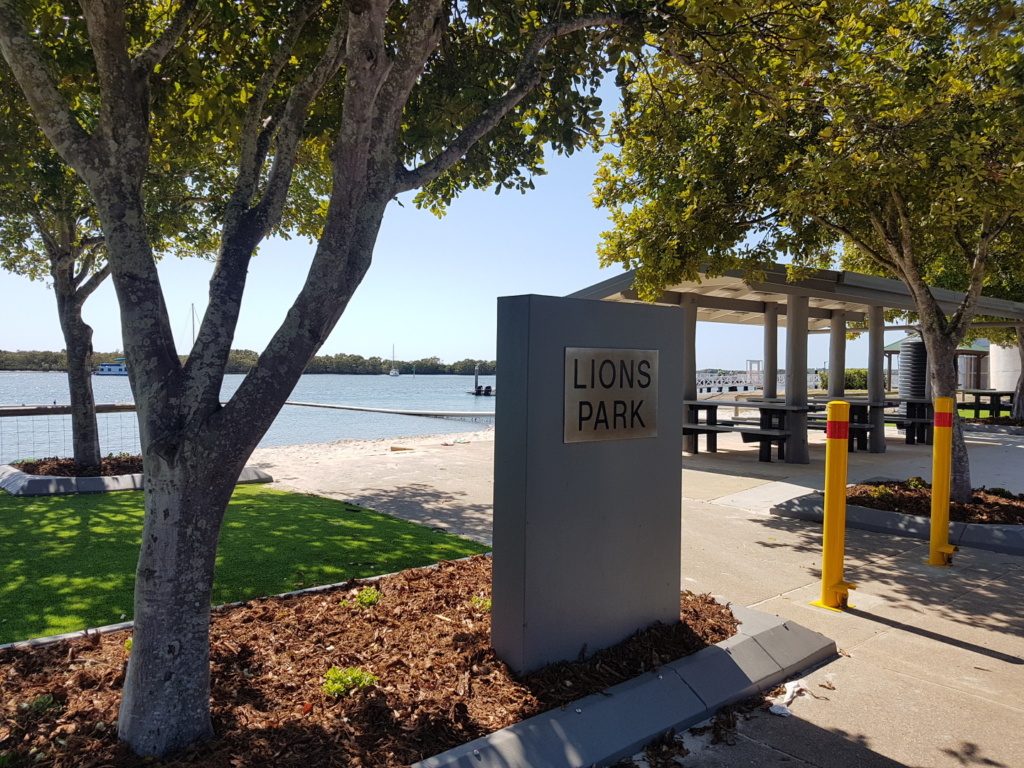
While many think the most northern beach area for children to swim is at Paradise Point, there is a lesser-known spot at the very northern edge of the Gold Coast – Lions Park at Jacobs Well. With easy access from the carpark, you are at a small, shaded beach in just a few steps. The swimming enclosure here has a small sandy beach, a large shade sail over the sand, and few waves, making it ideal for toddlers and younger children gaining confidence in the ocean. Parents will love the ability to sit on a blanket under the shade and still be close enough to their children in the water.
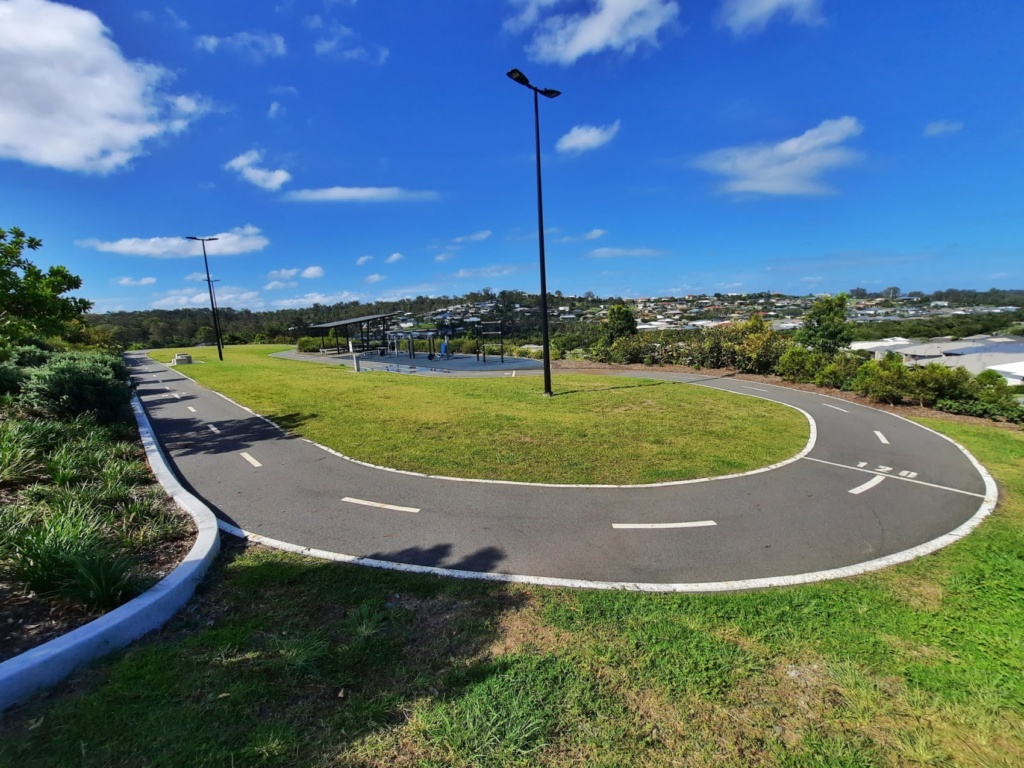
While the playground at Outlook Park, Ormeau may be tiny, pack the bicycles and prepare yourselves for the surprise bike tracks that make this a fabulous spot to visit! Set on a steep slope, Outlook Park is laid out over three levels. At the top you’ll find a small playground best suited for toddlers, and then on the middle and lower level there are two bike tracks, perfect for racing on. While the playground is very small, the bike tracks are great for bicycles, skateboards or scooters, and children will love lining up at the start line and racing the loops to the finish. Celebrate with some pretend play medal ceremonies on the dais at the track!
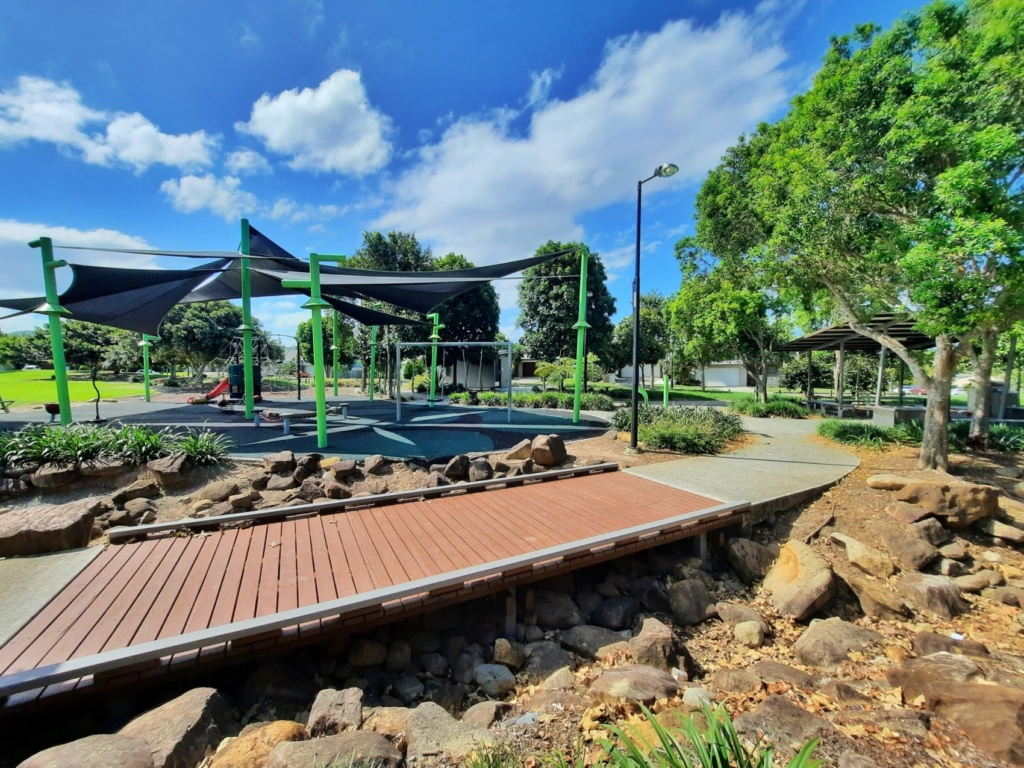
Hilltop Park in Ormeau is an older park, but still delivers a great time. Split into two sections, toddlers will love the smaller, shady play area with a car, climbing frame and mini playground with slide and swing. The main playground space is better suited for children over five, with a larger playground and slide, large climbing net, balance beams, spinners and swings. Children can also climb the ramp up to the old water tower, which has been converted into a play structure.
The northern Gold Coast offers a variety of unique and exciting activities for the whole family. From classic drive-in movies to hands-on creative workshops, scenic playgrounds, and delicious dining options, these suburbs have something for everyone. Whether you’re looking for a relaxing day by the water or a more adventurous outing, there’s no shortage of fun to be had. Next time you’re planning a family day out, consider exploring the hidden gems of Stapylton, Ormeau, Yatala, and beyond—you might just discover your new favourite weekend spot!
Little Scholars provides quality early education and care for children across South East Queensland, including five early learning campuses in Stapylton, Yatala and Ormeau.
We offer your child the very best facilities, resources and early educational, play-based programs available, which are underpinned by the early years learning framework. We believe that through quality education and care for children, we can also encourage, assist, and support the entire family.
Our dedicated team of educators are committed to the individual needs and interests of children and their families, and thus we encourage and welcome family input and involvement.
Find Lara’s recommendations at her website Mrs. Lardeedah.com, and follow her socials Facebook and Instagram

The Gold Coast is known for its abundance of good food and stunning dining options, but when you have young children in tow – often the thought of dining out can be daunting. Thankfully, many local restauranteurs have heard the call of parents seeking family-friendly dining options. We’re now seeing dining venues with amazing menus, family-friendly fit outs and features to help keep the children occupied while you enjoy a hot meal. Whether it be a playground, a simple children’s corner, or open spaces to move around safely, there are plenty of choices for you to enjoy your next meal out. Here are my top six family-friendly dining venues on the Gold Coast that you should be sure to visit!
This shopping centre café is a hidden gem, saving the sanity of parents for many years now. With opening hours stretching from 5.30am – 9pm, you can often find those parents with early-risers enjoying a hot coffee at Café 63 in the early hours. Located in the incredible “Backyard” precinct at Westfield Coomera, the outdoor dining area overlooks a fun-filled obstacle course with adventure play suited to four-eight year olds. For the youngest children, a nearby splash pad and toddler sensory zone also serve as great spaces to stretch the legs while waiting for your meals to be served. The menu here is extensive and well-priced, including a fabulous children’s menu that will please everyone.
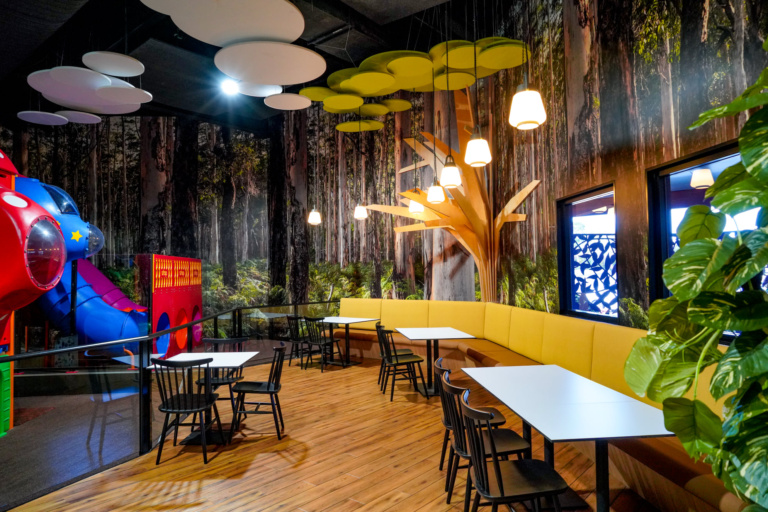
Here you will find a huge indoor children’s playground for four-12 year olds, with a family specific dining space attached. Separate from the rest of The Wattle Hotel’s restaurant, this glassed-off dining room overlooks the playground and contains about 15 tables. Here children can easily move back and forth between the playground and the table while their parents can see them at all times. There is a great children’s menu and delicious daily specials to enjoy, this is modern bistro dining that can be enjoyed by all the family.
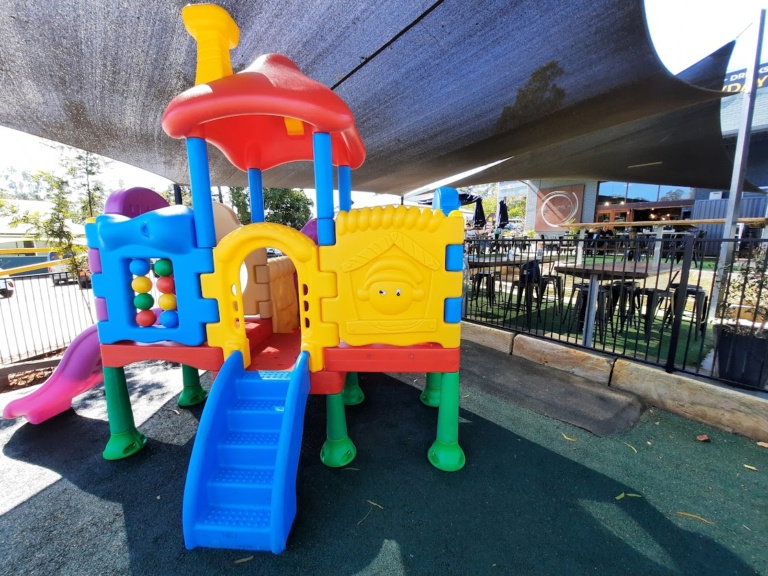
A café best known amongst the Coast’s cyclists thanks to its location near the Velodrome and bike shops, Cadence Café also caters beautifully to families seeking great food. Set across three terraced levels, the venue is connected by a central path and steps – at the top is the café, the middle level has plenty of dining tables and chairs, and the lower level is home to high bar tables overlooking a fenced children’s play space. All levels are shaded by a beautiful fig tree, have ramp access, and dogs are also welcome in the outdoor areas. Serving breakfast and lunch, the menu caters well to families, and you are sure to enjoy a delicious meal.
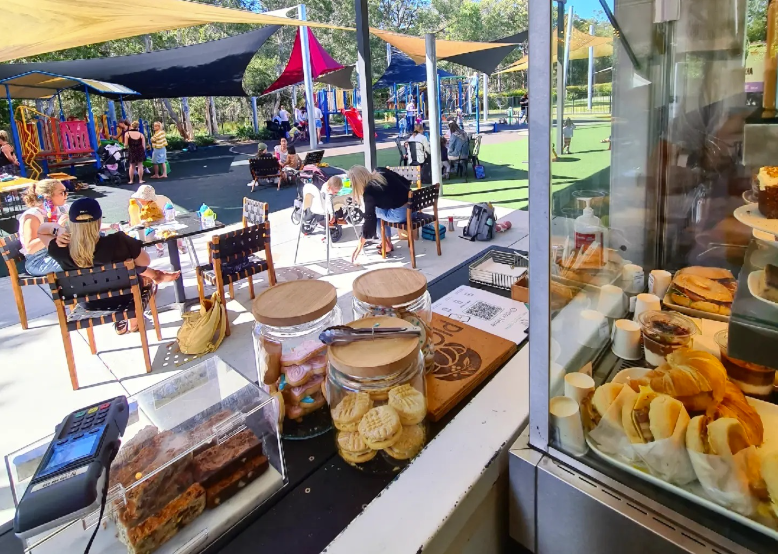
Just off the hustle and bustle of Olsen Avenue sits the Latte Lounge, a family-friendly oasis amongst the gum trees. Here you will find house-roasted specialty coffee and a delectable brunch menu, plus one of the best children’s menus you will find at a café. The open-air café is almost the second-best attraction, when you see the large, easily accessible playground right in the middle of the café. Designed for all ages, this fenced café and playground is covered by large shade sails and offers plenty of shady spots to enjoy your meal. With its central Gold Coast location, this is also an extremely popular spot for birthday parties and play dates. Thankfully, due to the size of the café and playground it never feels overly busy or crowded and is always a delightful outing.
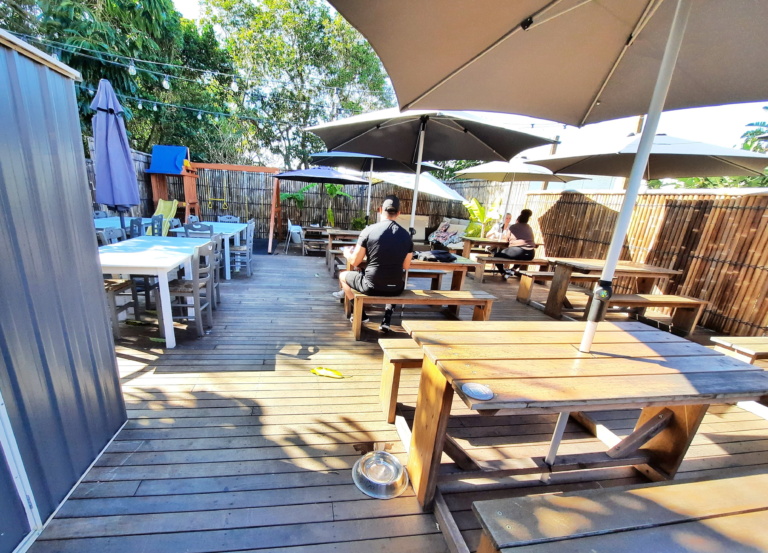
This hidden gem on the southern end at first appears to be a juice bar, but venture inside and you will find a breezy indoor/outdoor café with children’s playground! Popular with the locals, this unassuming little spot is filled with sunshine, great food and service with a smile. This is a family-run café with its roots in healthy superfoods that taste phenomenal. Dog friendly, the outdoor deck is the place to be, with easy line of site to the children’s playground. The café kitchen is only open Thursday – Monday, but the juice and smoothie bar is open 7 days.
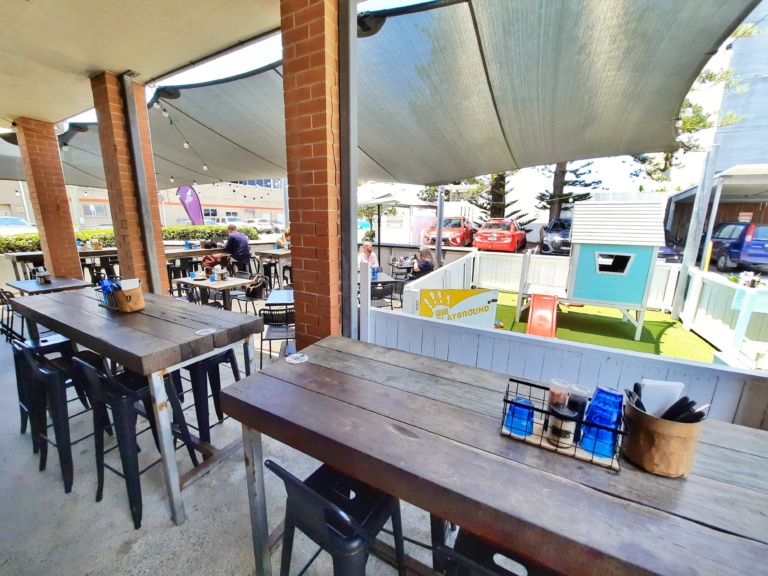
With beautiful coastal vibes, indoor/outdoor dining is essential on the Gold Coast, and BSKT serves it up perfectly. Located just steps away from the beach, BSKT has delicious food, ample seating and a fenced children’s play area. Pronounced biscuit, this menu is packed with vibrant colours and bold flavours, but also caters well to children. BSKT doesn’t take books and this spot is extremely popular on the weekend, but wait times are usually short. Be sure to grab a spot outside under the patio to have easy access to the play area! Why not pack the swimwear and walk over to the beach afterwards!
Find Lara’s recommendations at her website Mrs. Lardeedah.com, and follow her socials Facebook and Instagram
Children’s positive views of themselves as learners are more important than being told they are clever.
This insight from Nathan Wallis’s talk at the Australian Childcare Alliance (ACA) conference resonated with us, and we believe it’s valuable for parents to hear. Our intention isn’t to make parents feel guilty for praising their children’s intelligence. We understand that parents aim to foster a strong sense of self and ability in their children, and we fully support this. However, Wallis emphasises that before the age of seven, children don’t need to prove their intelligence. Instead, they need to develop learning skills through play and believe in their ability to learn. According to Wallis, more play and less structured learning before age seven leads to better outcomes in adulthood.
“To put it simply, before seven, it doesn’t matter how clever your child is. What matters is how clever your child feels and their disposition towards themselves as learners,” Wallis, an educator who focuses on neuroscience, explained on the Future Focus podcast.
“You’re better off having a six-year-old who can only count to 20 but thinks they’re a good learner than a six-year-old who can count to 100 but doubts their cleverness.”
Wallis highlights that free play boosts creativity and problem-solving, which are essential for intelligence. Letting children freely build, create, and explore supports flexible thinking and a positive learning mindset.
At the conference, which attracted hundreds of early childhood educators, Wallis offered advice on how to support children in their confidence and ability to learn:
Experts at Early Childhood Australia agree that children learn about themselves, others, and the world around them through play.
“If you provide your child with plenty of opportunities for playing, exploring, discovering their interests, solving problems, and tackling challenges, then you’ll be laying a strong foundation for building self-confidence,” says David Lyons, CEO of Nido Early School, in a post on ECA’s The Spoke blog.
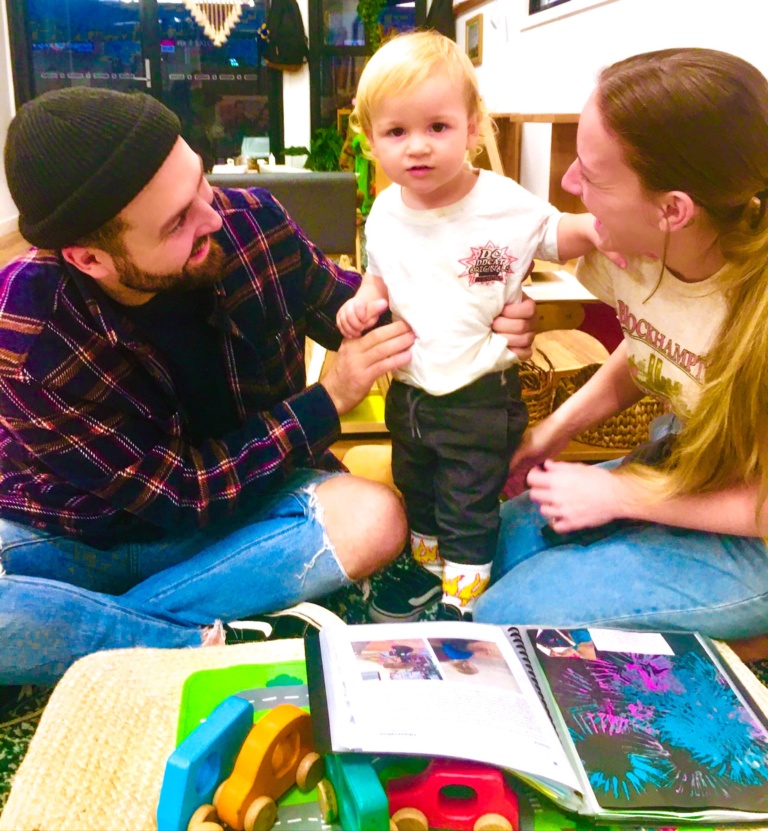
According to Be You, the national mental health and wellbeing initiative for learning communities in Australia, praise is most effective when adults are mindful of how and when they use it.
When praising children, Be You suggests focusing on their efforts and achievements.
“Praise that’s specific and acknowledges the process of completing an activity or solving a problem helps develop children’s learning and motivation. For example, you might say, ‘You put away your toys so nicely,’ ‘I noticed you were really trying hard at building that block tower,’ or ‘You’ve used so many bright colours in your painting.’ Children can then use this learning when they have similar experiences in the future.”
Lyons agrees and cautions against overpraising.
“Children need to discover and learn those things that give them personal enjoyment and fulfilment, not just do things to please their parents. Similarly, comparing a child to others can be detrimental to their confidence and self-esteem.”
Dealing with disappointment is also crucial for developing confidence.
“Everyone fails to achieve their goals sometimes – and this isn’t a bad thing. You can build children’s ability to deal with challenges by responding sympathetically and with encouragement, helping children focus on what they can change, and challenging ‘I can’t’ thinking by showing and saying you believe in them and reminding them of their achievements,” says Be You.
Wallis reinforces that play enables children to develop social, cognitive, and emotional skills through their own interests and in creative and innovative ways.
“Play-based learning teaches creativity, which is fundamental to growing intelligence and the ability to problem-solve. When children can take their time and make multiple attempts before achieving success, they build resilience and other important skills needed later in life,” says Wallis.
Supporting children in developing a positive self-view as learners is crucial, especially in their early years. Emphasising the importance of play over structured learning fosters creativity, problem-solving, and resilience. By providing nurturing relationships, paying attention to their efforts, and creating flexible learning environments, we can help children build the confidence they need to thrive.
As Nathan Wallis and other experts highlight, the goal is to make children feel capable and enthusiastic about learning. This foundation will benefit them not only in school but throughout their lives. At Little Scholars, we encourage our little ones to play, explore, and believe in themselves – because how they see themselves as learners today will shape their success tomorrow.
In today’s fast-paced world, science, technology, engineering, and mathematics (STEM) are the driving forces behind innovation and progress. To equip the next generation with the skills they need to thrive in this exciting landscape, we have to recognise the incredible impact of early childhood education. A recent study conducted by researchers at the University of California Irvine has revealed the transformative power of high-quality early childhood education and care (ECEC) in nurturing children’s STEM achievements throughout their educational journey.
The study’s findings are both exhilarating and promising. They show that children who have access to top-notch ECEC before starting school are more likely to excel in STEM subjects as they progress into high school. This underscores the vital role of investing in early education and providing children with the necessary tools and support to build a strong educational foundation.
The researchers identified two key factors that contribute to the success of early childhood education in fostering STEM abilities. Firstly, igniting children’s curiosity through cognitive stimulation has a profound impact on their problem-solving skills and overall STEM performance. Early childhood educators who create engaging learning environments and incorporate hands-on experiences play a pivotal role in nurturing children’s passion for STEM. Secondly, the study emphasised the crucial role of educator sensitivity and responsiveness. When educators demonstrate empathy, attentiveness, and genuine care for children’s needs, it not only supports their overall development but also significantly influences their STEM achievements. The emotional connection established during these early years lays the foundation for children’s social-emotional skills, which are closely intertwined with cognitive development.
Interestingly, the study also revealed that sensitive and responsive caregiving in early childhood has an even greater impact on STEM performance for children from low-income families compared to their peers from higher-income backgrounds. This finding highlights the importance of addressing equity in early education and ensuring that all children, regardless of their socioeconomic status, have equal access to high-quality early learning that fosters STEM engagement. Speaking of STEM, did you know that Little Scholars offers an exciting STEM program for our kindergarten children? In collaboration with our friends at Lab Kids, we provide an incredible educational STEM program that aligns with the Early Years Learning Framework and the Australian National Curriculum. From exploring motion and states of matter to learning about light, sound, and chemical reactions, our curious little scholars embark on an exciting journey of STEM discovery!
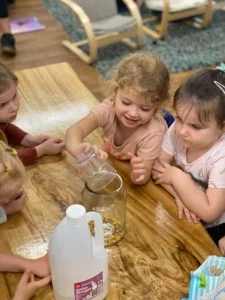
Finally, the University of California Irvine study reinforces the immense value of early childhood education in nurturing STEM success. By providing high-quality early learning that fosters curiosity, responsive caregiving, and an inclusive learning environment, we begin to realise the full potential of our Little Scholars. Book a tour at Little Scholars.
Are you a parent racking your brain trying to figure out how to get your little one to stop hitting, biting, or pushing other people?
The good news is, it’s really common. The bad news for you is, it’s still your child doing it and you have to deal with it.
For babies, this is a way to explore the world through cause and effect. Besides teething, babies bite to see what you’ll do. If you laugh, they might try it again to get the same reaction. If you get mad, that baby might be fascinated by your reaction, not quite understanding facial reactions and meaning.
For toddlers, they may have seen other children do it. They might do it because they’re angry, upset, hurt or excited and don’t have the means to express it differently.
Both babies and toddlers could be pushing, biting or hitting because they feel overwhelmed, bored, overtired or hungry.
No matter why your child is doing it, it can be frustrating and embarrassing for parents. But know that it’s not about you. It’s not your failure as a parent. When we think our child’s behaviour with us is a reflection on ourselves, we bring a lot of baggage with our response.
Now’s the time to manage it calmly.
“I like to explain to parents that these kinds of behaviours aren’t usually appropriate, but are age-appropriate and can come from a place of frustration in children,’ says Claire, an educator at our Nerang Campus.
“Biting is common around the age where children are beginning to learn how to talk and can’t quite get the words out and are frustrated.”
It is important to ensure when you are guiding a child’s behaviour to label the behaviour and not the child, Claire says. Telling them they’re being bad or naughty isn’t effective, and it isn’t likely to change the behaviour. Remember, every child is good. They are learning everything, including regulating and dealing with emotions and impulse control.
Claire also recommends not projecting your own feelings about your child’s negative behaviour. For example, try not to make statements like ‘Stop it, you’re making Mummy sad’ or ‘Look what you did!’ Try to remember that your child is learning empathy, so putting shame or guilt on their actions won’t fix the negative actions.
So how do you respond?
Stay calm. Your emotions can set the tone for how to bring down a heightened moment. By yelling or immediately punishing, you’re giving that undesirable behaviour attention. It’s also modelling explosive reactions, like what you as a parent are trying to adjust.
A calm, firm response could look like ‘Hitting/Biting/Pushing is never OK. I won’t let you hurt your brother.’ If the behaviour continues, a follow-up ‘I’ll move your brother over here to keep everyone safe.’
This sets and actions the boundary for behaviour. Once everyone is calmed down, that’s a better opportunity to teach coping skills, according to Sarah, an educator in our Senior Kindy studio from Deception Bay.
“Calm approach, sometimes for the older children, they need that time to themselves let them have their rage in a safe way, of course. There is no point in trying to get them to calm down when they are in the state they are in. It’s best to wait and then talk to them once they are ready,” she says.
If you feel your child is old enough to have a conversation about what happened, you could follow with, ‘You seem to have a hard time not pushing, I wonder why that is?’ If they tell you what/who is bothering them, you could tell/make up a similar story and tell them how you handled it. By modelling a response to a negative feeling, parents can help children understand and regulate their emotions.
Brooke, a Schoolies educator also at our Deception Bay campus also suggests asking the child what they need in that time can help.
“Every child is different and an approach that will work with one might not necessarily work for another or might not work every time which makes things difficult,” Brooke says. “I feel like asking the children what they need in that time is a big thing in diffusing a situation, because some children could want the space, where others may need a hug to feel safe and secure.”
Hayley, an educator also at Deception Bay in our toddler studio, agrees how the situation is dealt with is not a one-size-fits-all approach.
“I would say it would depend on the situation, age group and other factors,” Hayley says. “If it’s a child that’s not going to stop, I would then definitely redirect either to a different activity or to someone that they feel more comfortable with. For example, say it’s a child from the Senior Kindy room who’s just moved up to the Kindergarten room, you could ask them, ‘hey would you like to go see (previous educator)?’ if they say yes, it removes them from the situation, and it’s the child’s choice too.”
“I also like to give them a choice when redirecting so, ‘hey I know you’re frustrated, would you like to go run outside or do you want to do some painting?”
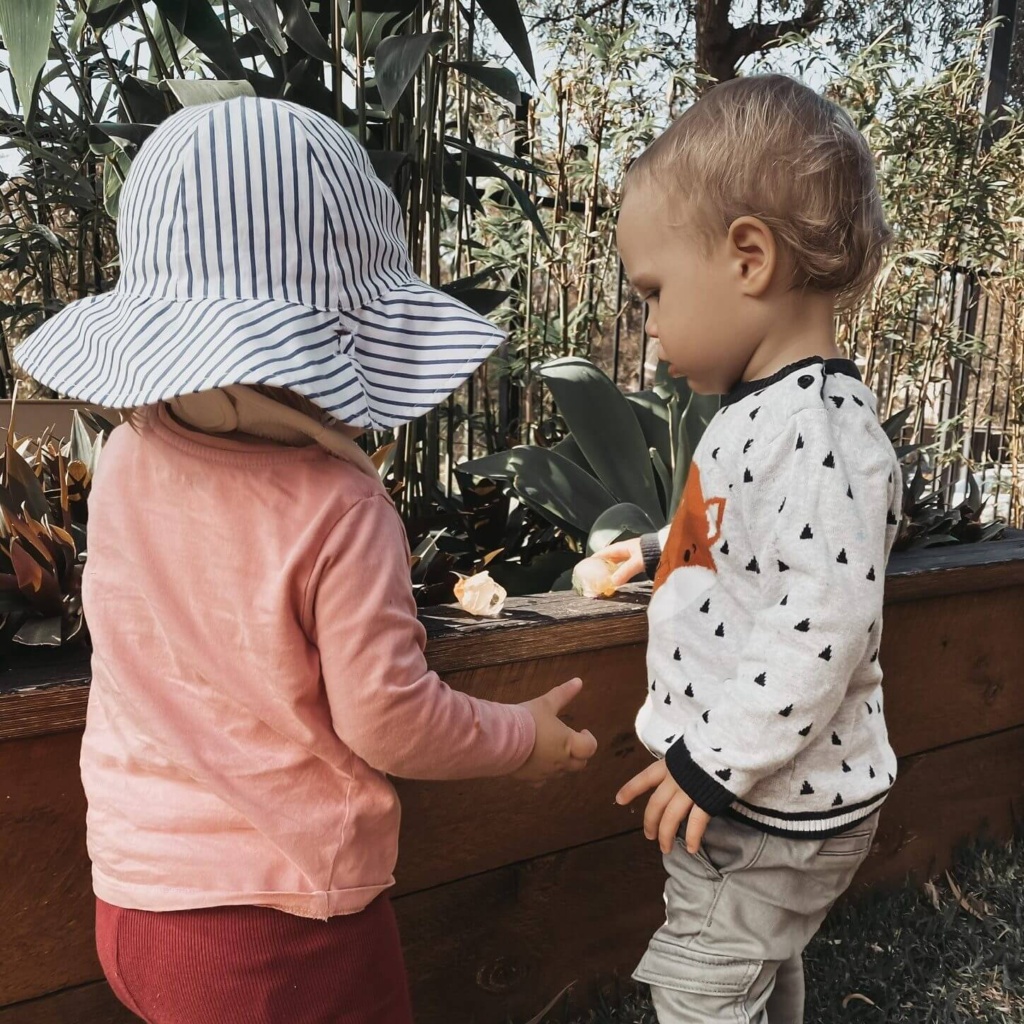
Some experts also recommend trying to fight the impulse to force your child to apologise. Children need to focus on learning to regulate those emotions, if you’re asking more of the child by forcing an apology, it’s likely to make them more frustrated or ashamed, and they won’t do what you’re asking, and certainly won’t feel like they’re being seen. They will learn apologies in time, but we don’t want them to think ‘when I’m sad I should say sorry’ but rather ‘when I’m sad I should think about what made me sad, take deep breaths, count to 10.’
However, it’s still important for your child to understand that other people have feelings too, so you could say, rather than forcing an apology, ‘Let’s see how we can make him feel better.” By involving your child in the resolution rather than ordering them to do something, you’ll likely see better results.
“Praise your children when they are doing something positive, even on the days it feels like all they have done is bite or hit,” Claire adds. “Soon enough they will be chasing the positive reinforcement and be replacing the negative behaviours with more positives.”
Guiding positive behaviour is a goal of Little Scholars by creating a safe environment for the children within our studios.
“This is guided by John Bowlby’s attachment theory,” explains Chloe, an educational lead at our Redland Bay South campus. Bowlby believed that the earliest bonds formed by children with their caregivers have a tremendous impact that continues throughout life.
“Every morning upon arrival, we create a warm welcome space for the children to be dropped off to. Once the children feel a sense of belonging within their learning environment, they are able to venture off and participate in the day’s learning.
“Respect and care are important parts of our day-to-day curriculum and is embedded in our learning by educating the children on their emotions identifying how they feel through use of conversation and cues, and guiding them in strategies that can assist with the way they are feeling,” she continues. “With these embedded practices, it helps to eliminate those rough behaviours.”
For more information:
Related topics
You can help bring Christmas joy to vulnerable families.
We are collecting new gifts for children (aged 0-17 years), parents and caregivers. The gifts will be distributed by Baby Give Back to families doing it tough via their network of caseworkers during December.
Only NEW Christmas gifts can be accepted.
We ask that all gift donations be made by 10th December 2021
At Little Scholars School of Early Learning, we’re dedicated to shaping bright futures and instilling a lifelong passion for learning. With our strategically located childcare centres in Brisbane and the Gold Coast, we provide tailored educational experiences designed to foster your child’s holistic development.
Let us hold your hand and help looking for a child care centre. Leave your details with us and we’ll be in contact to arrange a time for a ‘Campus Tour’ and we will answer any questions you might have!
"*" indicates required fields
Let us hold your hand and help looking for a child care centre. Leave your details with us and we’ll be in contact to arrange a time for a ‘Campus Tour’ and we will answer any questions you might have!
"*" indicates required fields